Back to School
A lot in store for 2023-24 academic year and diocese's 10 campuses
New superintendent eager to start the academic year
By Jim Wogan
Mary Ann Deschaine, a veteran educator with nearly three decades of experience as a teacher, principal, and superintendent, was announced as the new superintendent of Catholic schools for the Diocese of Knoxville on May 31.

She served as superintendent of Catholic schools in the Diocese of Saginaw, Mich., from 2011-18, and held the same position in the Diocese of Wheeling-Charleston, W. Va., from 2018 until her appointment in Knoxville.
Mrs. Deschaine is married and has five grown children. She and her husband, Mark, a university-level associate professor of education, have now made Knoxville their home.
Just two days after her first day on the job, Mrs. Deschaine appeared on the “ Inside the Diocese of Knoxville ” podcast with host Jim Wogan to discuss her transition to East Tennessee and her very early assessment of Catholic schools here. The following interview has been edited for clarity and length.
JW: Welcome to… the diocese.
MD: Thank you very much. I am very excited to be here… such a beautiful diocese.
JW: I was walking through the parking lot, and I saw, I think they were teachers getting ready for the school year. You can see the excitement. I can imagine, even
Former diocesan superintendent looks forward to a school-setting return at KCHS
By Bill Brewer
It’s back to where it all began for Dr. Sedonna Prater. And that is an answered prayer.
As the 2023-24 academic year starts, Dr. Prater transitions from superintendent of schools for the Diocese of Knoxville to vice president of academics at Knoxville Catholic High School.
And while honored at serving the diocese’s 10 schools for a decade, returning to high school is an opportunity to connect with students and parents “where they are” for the longtime teacher, principal, and diocesan administrator.
Dr. Prater concluded her work as superintendent in July. Earlier this year she announced she was stepping down to return to an inSchools continued on page A9
Improving the body, mind, and soul
Notre Dame High School places priority on student success, facilities upgrades
By Bill Brewer
The body. The mind. The soul. They are the three elements of success at Notre Dame High School.
In addition to its primary ministry of bringing students to Jesus Christ through learning and faith formation, Notre Dame sees its mission as fivefold academics, athletics, arts, finance, and enrollment as it works to strengthen its body, mind, and soul.
And Deacon Hicks Armor, who is entering his second year as head of school at Notre Dame, knows there is an appropriate balance that helps the entire school accomplish that mission.
“You have to develop the mind, the body, and the soul. The mind is the classroom. The body is the athletic fields, the gym, the tennis court, the basketball court, the football field, and the lacrosse field. The soul is the Catholicism, the Christian lifestyle that we promote,” Deacon Armor said in giving an update on progress Notre Dame is making in better accomplishing its mission. Deacon Armor shared a state of
Notre Dame High School report as the Diocese of Knoxville’s 10 schools begin the 2023-24 academic year.

On a mission Notre Dame also is on a mission to better tell its story in the community, which Deacon Armor believes is critical to the Chatta-
nooga school achieving goals to increase enrollment and development and upgrade facilities.
There is an updated campus strategic plan with a dozen initiatives being readied as the new school year begins. Among the 12 items in the strategic plan are teacher pay, expand some academic and athletic programs, and
a new facilities master plan.
Deacon Armor reports that Notre Dame’s leadership has been working to improve the school’s finances with success. After recording deficits in recent years, the high school recorded a surplus in the 2022-23 school year.
And after enrollment had been declining in recent years, he said 396 students are enrolled for the 2023-24 academic year, with an additional 10 students expected to be in class as the school year gets underway.
In the class of 2023, there were 99 graduates who walked across the stage in May. They are attending 40 different colleges in 14 states, with 90 percent of them receiving merit scholarships valued at $2.3 million, and 86 percent of the class is eligible for the Hope Scholarship.
Deacon Armor is intent on maintaining that upward trajectory through initiatives aimed at attracting new students, communicating the school’s message, focusing on major gifts and planned giving, administration building upgrades, campus enhancements,
Notre Dame continued on page A8
COURTESY OF NOTRE DAME HIGH SCHOOL/STEPHANIE
RICHER
Enjoying high school life Notre Dame High School students share a lighthearted moment while going to class at the Chattanooga school.
Getting to know you New Diocese of Knoxville schools superintendent Mary Ann Deschaine meets new school employees at an orientation session on July 26 at the Chancery. Superintendent continued on page A13
BILL
Catholic commentary A3 Parish news B4 Diocesan calendar B5 Columns B6-7 Catholic schools B9-10 La Cosecha Section C REACHING THE FAITH-SEEKERS RCIA Summer Conference helps A10 CLASSICAL EDUCATION Chesterton Academy opens for students B1 FATHER DOWLING'S FEAT LEADS TO FETE Signal Mountain priest marks 40th anniversary B1 August 6 | 2023 VOL 31 NO 12 IN THIS ISSUE
BREWER
‘Let us mingle and grow together ’
Pope Francis to youth: Look to elderly for important lessons on life, faith
By Justin McLellan Catholic News Service
The Gospel calls Christians to bring the elderly to the center of their lives and away from the margins of families, politics, and financial markets that banish them as “unprofitable waste” in society, Pope Francis said.
“Let it not happen that by pursuing the myths of efficiency and performance at full speed we become unable to slow down to accompany those who struggle to keep up,” the Holy Father said in his homily at a Mass for World Day for Grandparents and the Elderly in St. Peter's Basilica on July 23.
“Please, let us mingle and grow together,” he said.
Elderly people in wheelchairs were seated in the front row before the altar and alongside Pope Francis. Several grandparents with young children in tow were
Sr. Regina

scattered among the estimated 6,000 people in attendance in the basilica.
“We need a new alliance between young people and the

elderly,” Pope Francis told them in his homily, “so that the sap of those who have a long experience of life behind them will nourish the shoots of hope of those who

are growing.”
“In this fruitful exchange we can learn the beauty of life, build a fraternal society, and in the Church we can allow for encounter and dialogue between tradition and the newness of the Spirit,” he said.
Cardinal Kevin J. Farrell, prefect of the Dicastery for the Laity, Family, and Life, which organizes the world day, was the main celebrant at the altar. The theme for this year’s celebration was “His mercy is from age to age,” taken from St. Luke’s Gospel.
In his homily, the pope related the elderly’s role in society to the three parables Jesus tells in the day’s Gospel reading from St. Matthew.
In the first parable, the devil plants weeds among a wheat crop while the householder is asleep, but rather than tell his slaves to pull them up he allows them to grow until harvest for fear of up-

Pope continued on page A19
How to sign up and qualify for Diocese of Knoxville’s safe-environment program
The Diocese of Knoxville has implemented the CMG Connect platform to administer the Safe Environment Program, which replaces the former Safe Environment Program (VIRTUS “Protecting God’s Children”).

element of the Safe Environment Program
The Handmaids of the Precious Blood in 2022 celebrated their Diamond Jubilee: 75 years since their founding in 1947; 75 years of prayer and sacrifice for priests. Did you know you can receive weekly cartoons and short reflections and news from the Handmaids of the Precious Blood? Visit their website, nunsforpriests.org, and sign up for the FIAT newsletter.
August Prayer Intention
CMG Connect is a web-based platform that will assist in ensuring that all employees and volunteers who are in a position of trust with children and vulnerable adults within Diocese of Knoxville schools and parishes are trained to recognize behavior patterns of potential abusers and provide pro-active measures for preventing abuse in any context.
“Safe Haven-It’s Up to You” is a three-part video that provides vignettes of real-life situations to educate the viewer about methods of grooming, desensitization, bullying, and neglect, all of which can lead to abuse.
Each part of the video is immediately followed by a brief questionnaire to further develop understanding.
Education is a key
DIOCESE OF KNOXVILLE


PROCEDURE FOR REPORTING SEXUAL ABUSE
Anyone who has actual knowledge of or who has reasonable cause to suspect an incident of sexual abuse should report such information to the appropriate civil authorities rst, then to the McNabb Center victim's assistance coordinator, 865.321.9080.
All clergy, employees, contracted school personnel, volunteers, members of groups and organizations over the age of 18 who work, volunteer, or participate in any capacity are required to complete the diocesan Safe Environment training and a criminal-background check before they can begin employment, volunteer, or participate with ministries, groups, and organizations affiliated with the Diocese of Knoxville.
In addition, the mandatory renewal training must be completed every five years and a new background check submitted before the five-year expiration of prior training.
The Diocese of Knoxville Safe Environment compliance training and renewal training is a condition of employment and for volunteer ministry in the Diocese of Knoxville.
The CMG Connect
WATCH UPDATES DioKnoxTV


platform contains all three elements of the Diocese of Knoxville’s Safe Environment Program:

n Annual review of the Diocese of Knoxville’s Policy and Procedures Relating to Sexual Misconduct; n CMG Connect Safe Haven training program to be completed every five years; n Criminal background check to be completed every five years.
In compliance with the Diocese of Knoxville’s Safe Environment Program, all affiliates require that volunteers and employees complete the requirements prior to working and/or volunteering in a parish, school, The Paraclete, or through Catholic Charities and/or St. Mary’s Legacy Clinic Go to https:// dioknox.org/safeenvironment on the Diocese of Knoxville website for more information ■
> CONTACT US AT 865.584.3307 OR bbrewer @ dioknox.org.
> FIND US AT dioknox.org.
NEWS FROM THE DIOCESE OF KNOXVILLE

EDITOR Bill Brewer bbrewer@dioknox.org
ASSISTANT EDITOR Dan McWilliams dan@dioknox.org
VISIT US ONLINE dioknox.org | etcatholic.org
THE EAST TENNESSEE CATHOLIC A2 n AUGUST 6, 2023 www.dioknox.org
“We pray the World Youth Day in Lisbon will help young people to live and witness the Gospel in their own lives.”
Pope Francis
© 2023 Handmaids of the Precious Blood
THE EAST TENNESSEE CATHOLIC (USPS 007211) is published monthly by The Diocese of Knoxville, 805 S. Northshore Drive, Knoxville, TN 37919-7551. Periodicals-class postage paid at Knoxville, TN. Printed by the Knoxville News Sentinel. THE EAST TENNESSEE CATHOLIC is mailed to all registered Catholic families in East Tennessee. Subscription rate for others is $15 per year in the United States. Make checks payable to The Diocese of Knoxville. POSTMASTER: Send address changes to THE EAST TENNESSEE CATHOLIC, 805 S. Northshore Drive, Knoxville, TN 37919-7551.
PUBLISHER Archbishop Shelton J. Fabre COMMUNICATIONS DIRECTOR Jim Wogan jwogan@dioknox.org DIGITAL MEDIA PRODUCER Emily Booker ebooker@dioknox.org
MULTIMEDIA REPORTER Gabrielle Nolan gnolan@dioknox.org CONTACT US 865.584.3307
ADVERTISE IN THE EAST TENNESSEE CATHOLIC FOLLOW US KnoxDiocese STAY CONNECTED dioknox CHECK US OUT knoxdiocese
NEWS
Message for the young and old Pope Francis greets 100-year-old Lucilla Macelli before celebrating Mass in St. Peter’s Basilica at the Vatican, marking World Day for Grandparents and the Elderly on July 23.
CATHOLIC
SERVICE PHOTO/LOLA GOMEZ
The ‘ Quality of Life’ error
Individuals with grave ailments raise the bar for all of us, and we should elevate them
By Father Tad Pacholczyk
During “serious illness conversations,” some doctors will ply their patients with this question: “What is your minimally acceptable quality of life?”
Behind the question can be the implication that if patients are experiencing a low quality of life, their medical treatments can be discontinued because their life has become “no longer worth living.”
This can even become a shorthand to justify actions like physician-assisted suicide or euthanasia.
Making quality-of-life assessments about ourselves or others can lead us to devalue the gift of human life by insisting it must have a certain amount of “quality” before it can be deemed “meaningful” or “worthwhile.”
The clearest rebuttal of the “Quality of Life” error I’ve come across was from a 64-year-old retired Boeing computer programmer named John Peyton (1945-2009).
He lived in Kent, Wash., and had an unusually aggressive form of amyotrophic lateral sclerosis, or ALS, commonly known as Lou Gehrig’s disease. The disease made him totally dependent on Patricia, his wife of 40 years. She dressed him, fed him, and regularly shifted his body position in the living room recliner, where he spent his declining months.
As Peyton’s once-strong voice gradually began to fade away, he continued to use it publicly to oppose and lobby against Initiative 1000, the assisted suicide initiative in Washington.
When he was interviewed by Laura Ingraham of Fox News, he said, “I’m one of those people who is somewhat of a target of the initiative, and I don’t know how we as a society could really consider making doctors into killers.”
Ms. Ingraham countered: “John, I think a lot of people who are for this type of assisted suicide would say, ‘Look, what about the quality of life?’ ‘Look, you know, people suffering like you — what kind of quality of life do you really have?’ What do you say to those people?”
His reply was as brilliant as it was simple:
“I have a marvelous quality of life! Right now I am totally dependent. I can do nothing for myself.
I’m effectively paralyzed. But I have a family. I have friends. I have my church community. I have loving support all around me. I don’t understand how anyone could deny that I have a very high quality of life, and it gets me to understand and be compassionate toward those without the support that I have. Rather than giving them the temptation to kill themselves, we should be trying to figure out how to help them to have the quality of life I enjoy.”
Peyton’s answer cuts to the heart of the matter: if anyone who is sick or dying is facing a low quality of life, we should take steps to raise and improve it.
His story also reminds us how the onesided category of “quality of life” can easily tempt us in the wrong direction when it comes to basic moral duties owed to our loved ones who are in compromised states like a coma, ALS, stroke, Alzheimer’s, or dementia.
Instead of making quality-of-life judgments about people, we should be making “quality-of-treatment” judgments for those who are ailing and vulnerable, and perhaps “quality-of-help” judgments against ourselves.
As such, our focus should be on the ben -
Individuals struggling with grave ailments, even though they may be very compromised and unable to act as their own decision-makers, remain people of great moral worth. They contribute to the common good simply by being, rather than by doing or choosing. Moreover, they continually call each of us to a higher and more beautiful standard of full acceptance, loving support, and authentic care, even and especially in the midst of very challenging medical circumstances. They raise the bar for us, and we should respond by elevating their quality of life
efits and burdens of a proposed medical intervention rather than on trying to impose our own conclusion that certain individuals no longer have enough value or meaning in their lives to merit receiving a particular treatment.
Their humanity is violated if they are treated according to their functionality or quality of life, rather than according to their personal dignity.
Of course everyone has a certain natural fear or hesitation when it comes to living in a disabled or a compromised state. We also may very well be afraid of “being a burden to others.”
When we acknowledge that the gift of life has “absolute value,” that doesn’t mean we must do absolutely everything scientifically available to maintain it, but it does mean that we should exercise good stewardship over it, making use of ordinary means of treatment and receiving supportive care, even in the face of imminent decline.
It also means the decision to refuse or stop a particular medical treatment should be based on the judgment that the treatment itself is extraordinary, that is to say, it offers minimal benefit or is unduly burdensome. It should not be because we conclude that someone’s life itself lacks value and needs to end.
Individuals struggling with grave ailments, even though they may be very compromised and unable to act as their own decision-makers, remain people of great moral worth.
They contribute to the common good simply by being, rather than by doing or choosing. Moreover, they continually call each of us to a higher and more beautiful standard of full acceptance, loving support, and authentic care, even and especially in the midst of very challenging medical circumstances. They raise the bar for us, and we should respond by elevating their quality of life. ■
Father Tad Pacholczyk is director of education for The National Catholic Bioethics Center

Copyright 2023, The National Catholic Bioethics Center. This column is made possible through a collaboration between the Diocese of Knoxville and The National Catholic Bioethics Center based in Philadelphia.
Pope Francis encourages participation in the Season of Creation
Creation Care ministries in Diocese of Knoxville parishes offering celebrations
By Mary Tankersley and Denise Clark
In 2015, Pope Francis boldly set out to make a profound moral and scientific statement regarding humanity’s relationship with the natural world by releasing his encyclical On Care for Our Common Home , or Laudato Si ’ ( Praise Be To You ).
Global response to this document has been overwhelmingly positive due to its accessibility to all readers and its accuracy regarding the cause-and-effect relationship between modern environmental degradation and social injustice.
Pope Francis wrote, “I wish to address every person living on this planet.” In doing so, he teaches all the intended care for creation by God, as well as the consequences of disregarding such care, which the 21st century is now witnessing with frequent environmental disasters and an increased number of environmental refugees across the globe.
Pope Francis continues this urgent theme of Laudato Si’ with his 2023 World Day of Prayer for the Care of Creation message, shared below. This message also serves to announce the Sept. 1 beginning of the annual ecumenical Season of Creation, which extends to Oct. 4, the feast day of St. Francis, our patron saint of ecology.
This year’s theme is “Let Justice and Peace Flow.” During these five weeks, all are encouraged to celebrate their faith and express gratitude for the incredible gifts of our common home, as well as taking decisive action in amending lifestyles and creating awareness for others to do the same.
2023 Season of Creation calendar of events Knoxville-Alcoa area
n Friday, Sept. 1: World Day of Prayer for the Care of Creation. 12:10 p.m., Mass at Immaculate Conception Church; 5:05 p.m., Mass at St. John XXIII Catholic Center on the University of Tennessee campus
n Sunday, Sept. 17, 1-4 p.m.: Care for Creation presentation and workshop with Sister Rose Marie Tresp, director of justice for the Sisters of Mercy of the Americas, at All Saints Church, 620 Cedar Bluff Road, Knoxville
n Sunday, Sept. 24, 4 p.m.: Bluegrass Mass at Our Lady of Fatima Church, 858 Louisville Road, Alcoa
n Monday, Sept. 25, 8 a.m.: Smoky Mountain hike along Middle Prong (8.3 miles total). Meet at Our Lady of Fatima to carpool. RSVP to maryetank@hotmail.com or elizmccac@icloud.com
n Saturday, Sept. 30, 8 a.m.: Ranger-guided walk at Seven Islands State Birding Park (accessible). Meet at All Saints at 7 a.m. to carpool. There is a $6-per-person fee, and registration is required. For more information, e-mail cjbrace@yahoo.com
■ Sunday, Oct. 1, 1 p.m.: Blessing of Animals at All Saints. Young Williams Animal Shelter will join for the Blessing of Animals
n Wednesday, Oct. 4, 4 p.m.: Feast of St. Francis outdoor Mass at Our Lady of Fatima
Pope Francis writes, “All of us can cooperate as instruments of God for the care of creation according to our own culture, experience, involvements, and talents.”
This year, a number of Creation Care ministries from Knoxville and Alcoa churches are offering opportunities for all parishioners to celebrate the Season of Creation. All are welcome to join for these events, as well as any others on the Season of Creation calendar:
n A Care for Creation presentation and workshop by Sister Rose Marie Tresp, RSM, from the Mercy Administration Center in Belmont, N.C., on Sunday, Sept. 17, at All Saints Church in Knoxville beginning at 1 p.m. n An outdoor (weather permitting) Mass at Our Lady of Fatima Church in Alcoa on Wednesday, Oct. 4, at 4 p.m.
The following is the official message from Pope Francis for the World Day of Prayer for the Care of Creation, given on May 13 :
Commentary
“Dear brothers and sisters!
“ ‘ Let Justice and Peace Flow ’ is the theme of this year’s ecumenical Season of Creation, inspired by the words of the prophet Amos: ‘ Let justice flow on like a river, righteousness like a neverfailing stream (5:24).
“The evocative image used by Amos speaks to us of what God desires. God wants justice to reign; it is as essential to our life as God’s children made in His likeness as water is essential for our physical survival. This justice must flow forth wherever it is needed, neither remaining hidden deep beneath the ground nor vanishing like water that evaporates before it can bring sustenance. God wants everyone to strive to be just in every situation, to live according to His laws and thus to enable life to flourish. When we seek first the kingdom of God’ (Matthew 6:33), maintaining a right relationship with God, humanity, and nature, then justice and peace can flow like a never-failing stream of pure water, nourishing humanity and all creatures.
“On a beautiful summer day in July 2022, during my pilgrimage to Canada, I reflected on this on the shores of Lac Ste. Anne in Alberta. That lake has been a place of pilgrimage for many generations of indigenous people. Surrounded by the beating of drums, I thought: ‘ How many hearts have come here with anxious longing, weighed down by life’s burdens, and found by these waters consolation and strength to carry on! Here, immersed in creation, we can also sense another
THE EAST TENNESSEE CATHOLIC AUGUST 6, 2023 n A3 www.dioknox.org
A18
Creation continued on page
Fr. Pacholczyk
‘There am I in the midst of them ’
Alive in You Catholic conference, service camp brings teens to diocese


 By Gabrielle Nolan
By Gabrielle Nolan
Jesus tells us in Matthew
18:20, “For where two or three are gathered together in my name, there am I in the midst of them.”
It is without question that Jesus was present when nearly 300 teenagers descended upon Knoxville on the campus of the Cathedral of the Most Sacred Heart of Jesus for the Alive in You conference the week of June 27–July 2.
According to its website, the vision of Alive in You is “to enable our participants to open their hearts and allow Christ to become the center of their lives. Our goal is to educate, motivate, and provide young people with a life-changing Catholic experience. Alive in You is grounded in the beliefs and teachings of the Catholic Church, and we strive to provide the perfect balance of faith, service, education, and fun.”
Alive in You was founded in 2006 by youth minister Jim Weir and his wife, Heather.
“I was a youth minister in Or-
lando at the time and was looking for an experience for our teens that really was a little bit more of a blend of service and spirituality,” Mr. Weir said. “We would take them to a conference and they would do, you know, have a lot of great things for the teens spiritually, but then they wouldn’t have service work. Or we might go to a work camp or a service event and do great work, but then it didn’t have the
spiritual elements to tie into it. So, we created Alive in You to kind of blend those two things so the kids could really understand how our faith is really what inspires us to go serve other people and the connection there.”
Mr. Weir currently is a youth minister at St. Joseph Parish in Fayetteville, Ark.
“I do junior high and high school ministry there, confirmation; I also teach eighth-grade
religion. Then in the summer, I take leave from my job there and run these camps,” he explained.
This summer’s camps included locations in Mobile, Ala., Orlando, Fla., Fond du Lac, Wis., and Knoxville. High school teenagers from all over the country travel to the camps.
Alive in You has come to the Sacred Heart Cathedral campus five times.
“We have this beautiful, annual relationship,” said Scott Barron, director of parish ministries for the cathedral. “We’re an evangelizing parish, so they match up with our mission. … It’s kind of nice to have high school-age kids living on campus and kind of just being part of our culture for a week, joining us in worship, and getting to meet with our staff as well. So, it’s kind of fun just to meet kids from different parts of the country.”
Mr. Weir agrees that “everybody on staff here and everybody at the diocese really understands and believes in our ministry and is completely sup-
Alive in You continued on page A17
T h e C l a u d e M e l l i L e a d e r s h i p S u i t e
Claude Melli, born to a farming family in Constantine, Algeria in 1929, enjoyed a long and prosperous career as an agronomist, farmer, and business owner His aptitude for success in business was rooted in a strong work ethic, enthusiastic attitude, and a commitment to improving himself through education In addition to his zest for entrepreneurship, Claude was passionate about his family, friends, travel, and a variety of interests that fulfilled his desire for a vibrant, active lifestyle Claude passed away in December 2021, but his legacy endures through an endowment gifted to St John Neumann Catholic School by Lydia Melli, his wife of 45 years
Lydia is passionate about the lasting impact education can make on one’s life, as it did for her and Claude Growing up in Morocco, she, too, came from a farming family, and her mother was a teacher Lydia studied to be a teacher in college and taught young girls in Morocco for a short period early in her life
Shortly after Claude passed away, Lydia thought that a gift to St John Neumann Catholic School would be a fitting tribute to him and a symbol of his belief in the everlasting value of education She decided to establish an endowment that would provide financial assistance to students as well as resources for teachers’ salaries and professional development In recognition of this endowment gift, the school leadership suite has been named in memory of Claude

“Claude was a firm believer, as am I, that education is the key that can unlock countless doors," said Lydia “Education, and particularly the wonderful teachers we were blessed with in our lives, made a lasting impact on us and our family My intentions with this gift are to remove barriers for students wishing to receive a Catholic school education, and to provide resources that will help SJNCS continue to recruit, retain, and develop the best possible teachers for its students ”
Fr Joe Reed Pastor of St John Neumann Catholic Church and School, said of the Claude Melli endowment, “One thing I love about this gift is that it supports the full spectrum of the educational experience, providing opportunity for both students and teachers to learn grow and thrive The faculty, staff, and students of St John Neumann are grateful for Lydia’s thoughtfulness and generosity, and we are honored that our school leadership suite is now adorned with Claude’s name and magnified by his legacy ”
To learn how you can give to St John Neumann Catholic Church or School, please contact Patrick Wade, Director of Development at pwade@sjnknox org or (865)777-3410 To give online, please visit sjnknox org/give

THE EAST TENNESSEE CATHOLIC A4 n AUGUST 6, 2023 www.dioknox.org
COURTESY OF
IN YOU (3)
DIANA RIZO/ALIVE
Shaping faith Teens taking part in the Alive in You summer Catholic conference at the Cathedral of the Most Sacred Heart of Jesus participate in a service project at the Muse Knoxville children's museum in June.
Community service Alive in You teen participants perform yard work for a Knoxville-area resident over the summer.
Good KARMa Alive in you teens assist at a KARM store in Knoxville while they were attending the Alive in You summer conference.
Photo of the Claude Melli Leadership Suite, which was dedicated in July during a gathering of Melli family members and SJN parish and school representatives.





THE EAST TENNESSEE CATHOLIC AUGUST 6, 2023 n A5 www.dioknox.org LIFE INSURANCE • DISABILITY INCOME INSURANCE • LONG-TERM CARE INSURANCE • RETIREMENT ANNUITIES © Knights of Columbus, 1 Columbus Plaza, New Haven, CT 06510 The Schachle Agency Daniel.schachle@kofc.org Chris Bivens 217-971-1812 Chris.bivens@kofc.org Josh Florea 865-335-1590 Joshua.florea@kofc.org Ron Henry 865-314-9441 Ron.henry@kofc.org Father McGivney’s founding mission was to protect the financial future of members and their families. His mission has
on for
lived
decades.
Fr. Ryan, ‘ Paboo’ Dunn lead to winning essays for students
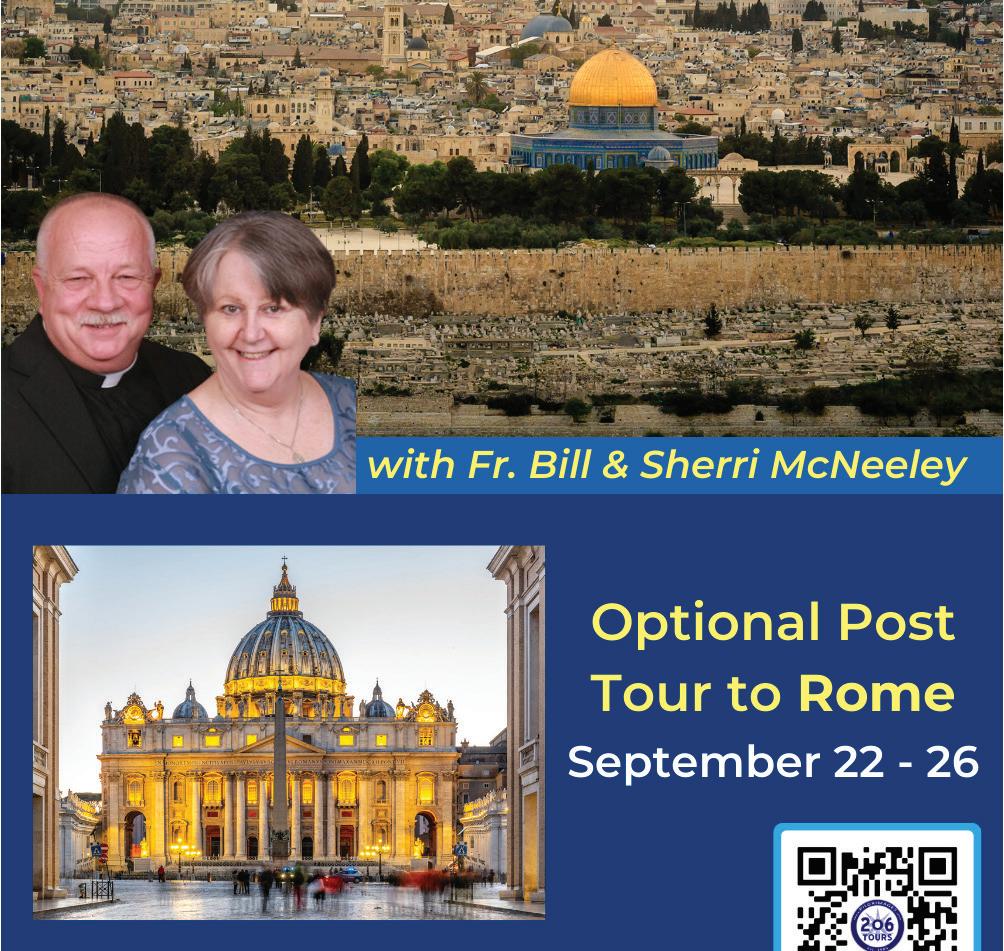
Young parishioners earn fi rst place in U.S. Catholic Textbook Project contest
 By Claire Collins
By Claire Collins
Two homeschool students in the Diocese of Knoxville were named the winners of the Catholic Textbook Project’s annual History Essay Contest.
Anna Hargett and Julian Crace, parishioners of Holy Ghost and members of the St. Benedict Co-Op, were the fourth- and fifthgrade winners. Their essays featured influential members of the Diocese of Knoxville and highlighted their contributions to the region.


In the fourth-grade division, students were asked to write about their state’s history, an important historical figure in their state, or an important historical site in their state. Anna chose to write about her grandfather, former state representative Bill Dunn, and the contributions he has made to Tennessee.
When asked what inspired her to write about her grandfather, Anna said, “He always was really good to me, and he just popped into my mind. … It was kind of hard because there were so many things that I had to put in it. But in the end, it turned out to be a really good experience.”
She chose two areas of focus for her essay: how Mr. Dunn helped students and homeschool students, too, and his contributions to the pro-life movement in Tennessee. She used newspaper clippings for her research and even sat down for an interview with him.
In her essay, Anna said, “While he was in office he helped Tennessee become a more pro-life state. Although he respected life in the womb he also deeply cared about children after they were born, which made him care about their education. Most significantly, Dunn let his faith guide him during his time in office. Boldly, Dunn worked to make Tennessee a great place to live. Many Tennesseans were proud to call Dunn their state representative. I am proud because he is my grandpa.”
Anna, who is 9, had first-hand experience with her grandfather’s work as a state representative, remembering campaigning for him when she was younger.
“We would put on our Bill Dunn shirts and walk around and campaign,” Anna recalled. “It was really fun.”
Anna’s mother, Elizabeth Hargett, is proud of her daughter’s hard work and thankful for the encouragement of her teacher, Lindy Crace.
“I was very excited,” Mrs. Hargett said.
“I put it all to Mrs. Lindy Crace. It was a lot of hard work, but she really helped the kids grow as writers, and it was just really great to see the fruits of Anna’s hard work. You can write well when you’re excited about the topic that you’re going to write about. And she was really excited to let people know about her Paboo and what he had done. So, it was neat to see her excited about it and her hard work and then get to be rewarded for it. ”
When asked how she found out about winning, Anna shared, “We were having rest time, and my mom called me down.
I thought it was an emergency. So, I came down and she said, ‘Anna you won!’ and I just couldn’t control myself.”
The prize, $100, was another added bonus
Oklahoma board OKs first Catholic charter school in the United States
Action opposed by state's attorney general
By Tyler Arnold Catholic News Agency
The state of Oklahoma has approved the country’s first-ever religious charter school.
The June move will allow public funds to pay the tuition of children attending an online Catholic school run by the Archdiocese of Oklahoma City and the Diocese of Tulsa.
The Statewide Virtual Charter School Board voted 3-2 to approve St. Isidore of Seville Catholic Virtual School in a three-hour-long meeting.
The “yes” votes included a new member who was appointed by Oklahoma’s Republican governor, Kevin Stitt.
In a statement, the governor applauded the decision.
“This is a win for religious liberty and education freedom in our great state, and I am encouraged by these efforts to give parents more options when it comes to their child’s education,” Gov. Stitt said.
“Oklahomans support religious liberty for all and support an increasingly innovative educational system that expands choice,” the governor added. “Today, with the nation watching, our state showed that we will not stand for religious discrimination.”
Because charter schools are public schools funded by taxpayers, the decision to fund a religiously affiliated charter school is already coming under legal scrutiny.
Republican Attorney General Gentner Drummond rebuked the board’s vote and said the action
was unconstitutional.
“The approval of any publicly funded religious school is contrary to Oklahoma law and not in the best interest of taxpayers,” Mr. Drummond said.
“It’s extremely disappointing that board members violated their oath in order to fund religious schools with our tax dollars. In doing so, these members have exposed themselves and the state to potential legal action that could be costly,” the attorney general continued.
Ryan Walters, Oklahoma State Superintendent of Public Instruction, disagreed with the attorney general, stating that the move expands school choice for the public.
“This decision reflects months of hard work and, more importantly, the will of the people of Oklahoma,” Superintendent Walters said.
“I encouraged the board to approve this monumental decision, and now the U.S.’s first religious charter school will be welcomed by my administration. I have fought for school choice in all forms, and this further empowers parents. We will make sure every Oklahoma parent has the opportunity to decide what is best for their child,” the superintendent added.
The U.S. Supreme Court has ruled that states cannot discriminate against religiously affiliated schools in its school voucher programs.
However, the constitutionality of charter schools run by religious institutions has not yet come up before the Supreme Court. ■
to the win. Anna spent her winnings on a camera because she likes taking pictures.
Another winner from Holy Ghost and the St. Benedict Co-Op was Julian Crace. In the fifth-grade division, students were asked to write about a historical figure who lived before the 1950s in North America who “made an impact on the Church and country.”
Julian chose to feature Father Patrick Ryan, a priest at Sts. Peter and Paul Church in Chattanooga who died serving those with yellow fever in the late 1800s and whose cause for canonization is being promoted.
When asked what inspired him to write about Father Ryan, Julian said, “I heard a lot about him, and it’s really cool because I thought his story was really cool, and I wanted to help him get canonized.”
As Julian wrote in his essay, “(Father Ryan) was a role model to all U.S. citizens and to all faithful Catholics. Because of his burning
Essays continued on page A13
THE EAST TENNESSEE CATHOLIC A6 n
6, 2023 www.dioknox.org
AUGUST
Budding photographer Anna Hargett, 9, center, is joined by her mother, Elizabeth, father, Zac, and siblings, John William, 7, Josephine, 5, and Benjamin, 1.
BILL BREWER (2)
Budding golfer Julian Crace, 11, center, is joined by his mother, Lindy, father, Morgan, and siblings, Elena, 13, and Marguerite, 3.
Archbishop Fabre announces diocesan appointments
Priests placed in consulting posts, to assist diocese until a bishop is named
The East Tennessee Catholic
Following the resignation of Bishop Richard F. Stika on June 27, and in accord with canon law, Archbishop Shelton J. Fabre, apostolic administrator of the Diocese of Knoxville, has announced a series of appointments to various consultative bodies that will assist him in the governance of the diocese until a new bishop is installed.

The Presbyteral Council acts as a senate of the bishop and is composed of representative members of priests. It assists in the governance of the diocese so that the pastoral welfare of the people of God may be more effectively achieved.

Archbishop Fabre has decreed to reconstitute the diocesan Presbyteral Council as the Presbyteral Council Pro Tempore, whose members are the same as the previous council, and who will serve in this capacity until
The Day of the Tournament
Check-In 7:00 a m
Breakfast 7:30 a m
Shotgun Start 8:00 a m
Lunch & Prizes at end of play
Sponsorship OPPORTUNITIES
Eagle $2,500
Special Clubhouse signage and recognition in tournament program Includes 8 player registrations

Birdie $1,500 Special signage and recognition in tournament program Includes 4 player registrations
Par $750 Recognition in tournament program Includes 4 player registrations
We serve Christ in humility, simplicity and charity.
Since our Knoxville beginnings in 1942 Ladies of Charity has consistently addressed the immediate and emergency needs of the underserved unemployed and underemployed people of the Knoxville area regardless of race creed color or country of origin

Faithful to the original mission, the Ladies supply enough to provide more than 264,000 meals every year Additionally, they continue to distribute free clothing, assist clients with medications and utility bills, distribute kerosene in the winter, and provide layettes for the babies of mothers in need
Thank you for supporting the Ladies of Charity in their mission to provide emergency assistance to those in need.
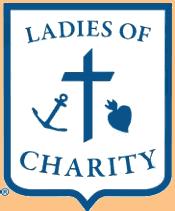
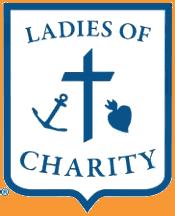
the diocese receives a new bishop.
Members of this council are Father Joe Reed (chairman), Father Mark Schuster (vice chairman), Father Ray Powell (record secretary), Father David Boettner, Father David Carter, Father Dustin Collins, Father Michael Cummins, Father Charlie Donahue, CSP, Father Martin Gladysz, Father Jim Harvey, Monsig-
nor Al Humbrecht, Father Peter Iorio, Father Michael Nolan, Father Manuel Pérez, and Father Tim Sullivan, CSP.
Archbishop Fabre will serve as president, and Father Doug Owens will function as his delegate.
The bishop of a diocese can group parishes into regional areas according to their geographic location. These regions are called deaneries. The Diocese of Knoxville has four deaneries. A dean or a special delegate coordinates the common pastoral activity of the priests and parishes in his area.
Archbishop Fabre has appointed the following special delegates to lead deaneries in the Diocese of Knoxville: Father Michael Cummins, Five Rivers Deanery; Father Peter Iorio, Smoky Mountain Deanery; Father Michael Nolan, Chattanooga Deanery; and Father Mark Schuster, Cumberland Mountain Deanery. ■
Benefitting Ladies of Charity ANNUAL
For more information contact:
Joe Sutter Golf Committee Chair (865) 384-4013 sutterjtn@aol com
Driving Range $500 Recognition in tournament program and signage on driving range
Putting Green $500 Recognition in tournament program and signage on putting green
Cart $100 Signage on cart
Hole $350 Signage on hole
Egwani Farms Golf Course 3920 S Singleton Station Road Rockford, Tennessee

Golf Tournament Format: 4 Person Scramble

Player 1 /
Captain
Phone: Player 4
Name: Address: City / Zip:

Email:
Phone:

I am unable to attend this year, so please accept my donation to help those in need: $250 $100 $50 $25 Other
I want to sponsor at this level:
Sponsor Contact Person:
Sponsor Name: For program/signage recognition


Phone/ Email:

THE EAST TENNESSEE CATHOLIC AUGUST 6, 2023 n A7 www.dioknox.org
CHARITY GOLF TOURNAMENT
Please mail your check (Payable to Ladies of Charity) and registration form to: Ladies of Charity 120 W Baxter Avenue Knoxville, TN 37917
Deadline: August 28 2023
Registration
of
Thank you for your support
Ladies of Charity!
of all abilities are welcome for a fun time! Individual sign-ups will be placed on a team Registration fee includes light breakfast beverages lunch and prizes at the end of play $125 per player /
Golfers
$500 per team
Team
Name: Address: City / Zip: Email: Phone: Player 2 Name: Address: City / Zip: Email: Phone: Player 3
Name: Address: City / Zip: Email:
Archbishop Shelton J. Fabre
Big challenges
“In my mind we have two great challenges: students and money,” he said. “Students bring money, but they don’t bring, in most cases, enough to cover full tuition. So therefore, you have to have money through development. Those two things, on top of a phenomenal faculty, make a school work.”
Work has been underway to increase enrollment, and efforts include making the campus more appealing to prospective students and their parents, expanding and upgrading athletic facilities, and updating academic areas.
Notre Dame also is taking part in the new school choice program the state of Tennessee has extended to Hamilton County. Students in Hamilton County’s public school system are now eligible to transfer to Notre Dame or its diocesan feeder schools, Our Lady of Perpetual Help and St. Jude, and receive tuition assistance to do so.
“I think we have had over the last 13 years a slow decline in enrollment, with some up years, but basically a decline,” Deacon Armor said. “I think it’s imperative that we do partnerships with our grammar schools, Our Lady of Perpetual Help and St. Jude, to increase our enrollment and truly evangelize the faith we believe. Additional students are imperative for us to grow as an institution. So, enrollment is key.”
To that end, Deacon Armor shared that when Bishop Emeritus Richard F. Stika and Deacon Sean Smith, Diocese of Knoxville chancellor, asked him in the spring of 2022 to fill the vacancy of Notre Dame’s leader, he agreed, albeit reluctantly, because his vocational strengths are business management and raising money, not education.

“Out of obedience and friendship to the bishop and Deacon Sean, I said yes. My only confidence was that I didn’t think God would walk away from me. By me saying yes and thinking I don’t know how I’m going to do this, (God) helped me,” he recalled. “If you ask me how my faith journey has been in the last year and a half, and if you ask me if God has talked to me today? No, but He sure gives me people. He certainly helps me out in situations.”
Deacon Armor now knows that God was with him every step of the way and that his early worries about getting the job done were unproductive.
As he occupied an office at Notre Dame, concerned about how he would accomplish objectives for
improving the school, he didn’t at first notice that also occupying an office was longtime diocesan educator Jamie Goodhard.
Ms. Goodhard taught English and served as development director at Our Lady of Perpetual Help from 1992-2001 before becoming principal of St. Jude, where she served from 2001-21. She then served as accreditation and special-projects coordinator for Diocese of Knoxville schools from July 2021 to June 2022.

Deacon Armor approached Ms. Goodhard about becoming the assistant head of school, and she agreed. That’s when his prayer for a lead educator was answered.
“People who are professional educators understand better than I the quality of education we have at Notre Dame, and I think that has been an unsung, understated fact. When you look at our honors courses, Advanced Placement courses, and dual-enrollment courses, we have three to five times more than our competitors and almost as many as the top three private schools in Chattanooga,” the deacon said.
Another answered prayer was finding expertise to handle development activities for the high school.
Jumpstarting development
To jumpstart the development process, Deacon Hicks informed Bishop Stika that he needed to raise money, and he wanted to get going first with the Chattanoogaarea Catholic churches to convince parishioners “to send me kids or money.” “Bishop Stika said, ‘How can I help you?’”
The Notre Dame graduate asked Bishop Stika to write and sign a letter that he could take to priests in the Chattanooga Deanery allowing him to go into churches to promote Notre Dame and its need for students and donations.
He proceeded to attend Masses, where he would read the Gospel and deliver the homily about Notre Dame. So began the effort to get Notre Dame’s story out into the community.
While visiting St. Thérèse of Lisieux Church in Cleveland, a man introduced himself and offered to help in any way he could.
St. Thérèse pastor Father Michael Nolan told Deacon Armor that the man, Carl Rohsenberger, has
worked as a development director and specialprojects coordinator for United Way of Greater Chattanooga from December 2017 to August 2022. Before joining United Way, Mr. Rohsenberger was a manager in the private sector.

“God sends you people. You have to be humble enough to ask and quiet enough to listen. If you can be humble and quiet and desperate He’ll help you,” Deacon Armor said. “Those are just two examples where He has put people in my path.”
He said it wasn’t hard to convince Mr. Rohsenberger and Ms. Goodhard to join him at Notre Dame.

“I think the school academically is there. I haven’t done anything academically (for the school). I’m a businessperson. However, my work is development, admissions, communications, athletics, facilities. I work the non-academic departments. Jamie is the academic person,” Deacon Armor explained. “This model works. And Jamie says we make it work because we have to.”
Deacon Armor praises retired Notre Dame principal George Valadie for his leadership in maintaining and raising Notre Dame’s high academic standards, which is vital to the school’s success.

And that strong academic reputation is critical to the jobs Deacon Armor and Mr. Rohsenberger are doing in reaching out to potential students, their parents, and people who might want to support the school financially.
The deacon, who serves at the Basilica of Sts. Peter and Paul, is passionate about promoting Notre Dame, so persuading families to join the Fighting Irish family and donors to open their checkbooks comes naturally. He began his education at Notre Dame Elementary School and then attended St. Jude School before going to Notre Dame High School. He was in the first class of third-grade students at St. Jude and the first freshman class at Notre Dame when the school relocated. He graduated from Notre Dame in 1970.
He continues to take the message of Chattanooga’s “hidden gem” into the Diocese of Knoxville community, not only because it supports Notre Dame, but it also evangelizes for the Catholic Church in East Tennessee.
“Catholic education sells. … We are supposed to evangelize.
Jesus told the Apostles to grow the Church.
… We’re supposed to grow the Church. We’re supposed to evangelize. If you can’t catechize, you can’t evangelize. Part of our mission as Catholics is to educate or catechize our youth, and this is the best way to do it,” he said. “I believe it’s something we have to do for our kids. I can do public speaking; I’m a deacon; I can read the Gospel; I went to Catholic schools; I can get up and give personal testimony about this.”
When Deacon Armor has visited churches, he has told congregations that an important part of the Catholic mission is to support Catholic education and that most everyone in the pews has been touched by Catholic education at some time or another.

He also asks parishioners to support Our Lady of Perpetual Help School and St. Jude School.
Fundraising gains
Notre Dame is having success with its annual fundraising gala that has raised nearly $200,000 for capital improvements, including new campus signage and landscaping and updates to the school’s interior.

Those are just two of several projects the school is launching to improve the campus and its facilities.
“In all of the studies we’ve had for all three schools over the last five to 10 years, one of the things they say is we need curb appeal. We’ve always said if we can get a kid in the front door, once they come in they will see the facilities are good inside, and the culture sells itself. We don’t have bullying. We don’t have cliques. It’s a very family-oriented group,” Deacon Armor said.
“So, if we can get a kid in the front door, nine times out of 10 they’re going to choose us over somebody else. When you drive up to some of our schools, they haven’t been updated. The last study said we need to update the entrance to our facility,” he added. “The gala last year raised a little under $100,000. We’re going to end up spending more than that on campus improvements. The front of the building has been painted. The downstairs has been renovated and updated. The upstairs
Notre Dame continued on page A11
THE EAST TENNESSEE CATHOLIC A8 n AUGUST 6, 2023 www.dioknox.org
COURTESY OF NOTRE DAME HIGH SCHOOL/STEPHANIE RICHER (7) and athletic facilities upgrades.
Notre Dame continued from page A1
Deacon Armor
Ms. Goodhard Mr. Rohsenberger
school setting.
“I have loved what I was doing in serving all 10 Diocese of Knoxville schools. It has been a great honor of my life to work with our Catholic schools at this level,” Dr. Prater said. “First and foremost, I wholeheartedly believe in the mission of Catholic school education. I think that Catholic schools have the best opportunity to serve the whole child, their spiritual formation, and their faith formation, and work with the families and minister to that.”
“I also believe that Catholic schools are one of the great shining stars for evangelization of the Catholic Church, to above all bring children and families to Jesus. I’ve been committed to this. And I have enjoyed at the administrative level serving and working with our schools in that capacity, working with pastors, working with school leaders, working with teachers,” she added.
However, Dr. Prater acknowledged missing the daily interaction with students and teachers that only happens in a school environment.
She said after much prayerful discernment about where Jesus was leading her next, she felt called to return to the school setting where she could again have direct impact on day-to-day teaching and learning with students and their families.

Dr. Prater recalls that she “loved” being a high school teacher before feeling called to go in a different direction early in her career. She then became a middle school teacher at Sacred Heart Cathedral School, where she taught history, English language arts, and foreign language.
“There I was called to serve in an administrative role, and I kept being called to serve in that area,” she said, describing her transition into school administration.
She became assistant principal at Sacred Heart in July 1998 and then served as principal of the cathedral school from July 2004 to June 2013. She became director of curriculum for all 10 diocesan schools in July 2013 and served in that role until she was named superintendent in April 2019.
“Now, this opportunity opened up, and I’ve kind of come full circle, coming back to high school, a place that I love, working with students, and I will still be serving Catholic schools,” she said.
At KCHS, Dr. Prater succeeds Jane Walker, who served the high school for more than 30 years, many of those years as academic dean.
Dr. Prater has worked with Ms. Walker and is an admirer of the former academic dean. “She has done a phenomenal job at Knoxville Catholic High School for years,” Dr. Prater said of Ms. Walker.
While her title and role at KCHS is somewhat different than Ms. Walker’s, Dr. Prater will continue as a lead administrator for academics.
“My role is over teaching and learning, so I’ll be directly involved with the teachers, the students, the academic program. I’m looking forward to being back in the school setting, getting to know the students, getting to know the teachers, and helping them,” Dr. Prater said.
“They (teachers) are on the front line and always have been. The teachers are the backbone of everything that we do. And they are the heart. I’m going to have more direct interaction with them while they are doing what they need to do to serve our students. I’m very excited about it,” she continued.
Dr. Prater’s familiarity with KCHS extends beyond her superintendent position. She was a Fighting Irish parent for several years as her children attended and graduated from the school, which is one of two diocesan high schools.
Going viral
Dr. Prater’s four-year term as superintendent was marked by the coronavirus pandemic, which hit in early 2020. While the epidemic forced schools and everything else in the United States to shut down, Diocese of Knoxville schools were closed only a short time as Dr. Prater and leaders of the 10 schools convened to implement a comprehensive remote-learning program where students could continue attending class from home.
Although the pandemic proved extremely stressful for schools, and students have borne the brunt of the contagion that claimed thousands of lives across the country, Dr. Prater said that period also included major victories in teaching, enrollment, and school finances.
When diocesan schools abruptly shuttered, Dr. Prater said KCHS was the only diocesan school equipped to teach remotely. However, the other nine schools quickly adopted the remote-learning techniques, implemented equipment, and went online.
Diocesan schools lost relatively little learning time compared with public schools, which suspended learning for months. Dr. Prater said it was “miraculous” that Diocese of Knoxville schools could acclimate to remote learning so quickly without losing appreciable learning time.

Diocesan schools became eligible for public funding to support schools impacted by the pandemic. The diocese and its 10 schools applied for and received Emergency Assistance for Nonpublic Schools (EANS) money as well as Governor’s Emergency Education Relief Fund (GEER) grants created to sustain public, private, and parochial schools during COVID-19.
“This is money the federal government provided during the pandemic for learning loss and to help schools get ready for remote learning. It involved technology, infrastructure, and all of that,” Dr. Prater noted. “Our schools have benefited greatly from it. And our parishes have benefited greatly since schools are a part of that. It involves close to $7 million. The GEER money was over $4 million, and in EANS I we received close to $4 million. EANS II was less, it was about $2 million more. All 10 of our schools applied for EANS funding, and all 10 received it in 2021. The funding had to be used for technology infrastructure, safe environment, and health protocols. Our schools used the money
for cleaning services, for school nurses, curriculum programs, and educational platforms.”
She pointed out that funding criteria allowed schools to improve their infrastructure, and at least one school was able to install new heating, ventilation, and air-conditioning equipment, which saved the school’s parish thousands of dollars.
“Our school leaders and faculty, our pastors, everyone mobilized to make sure that we got the infrastructure, the programs, everything. We received those grants. We used that money to build up the infrastructure for technology so we could go remote. We used it to get the computers, and we also used it for nurses and other things we did not have. That was EANS I,” she said.
A second round of government funding, called EANS II, was applied for by the diocese, and seven of the 10 schools received this money. Criteria for this funding round hinged on the number of students who met poverty guidelines and restrictions on school vendors.
Dr. Prater said a number of private and parochial schools across Tennessee did not qualify for EANS II funding, so there was money left over in the funding pool. In 2022, she and other independent school leaders across the state successfully lobbied Tennessee’s governor to shift that leftover EANS money to the GEER grants. Nearly $80 million was left unused in the EANS II funding pool in Tennessee, according to Dr. Prater.
“We convinced them to move the money to the GEER and redistribute that money through GEER grants, which the governor has discretion over,” she said, noting that nine of the diocese’s 10 schools received the next round of GEER grants totaling approximately $4 million.
“There were again designations as to what you could use the money for, but one of the things you could use it for was ventilation systems, which many of our schools did. Our schools that had aging air-conditioning units purchased new air-conditioning units. That fit under the category, and it’s exactly what the public schools did. And that helped the parishes,” she said. “That is significant because of operational vitality, which we’ve heard a lot about. Thanks to this money, parishes didn’t have to expend money for these items,” she noted.
She cited St. Jude School in Chattanooga, which has been in
need of a new heating and airconditioning system. Now the school is able to purchase one with GEER money, which helps St. Jude Parish. And Notre Dame High School in Chattanooga will have money to make needed improvements, too.
“Also, our schools for the 202324 academic year are probably going to get grants from the state for school safety. All 10 schools have applied for the school safety grants for improvements that will impact our school buildings,” she added.
She said discussions still are taking place at the state level as to whether private and parochial schools can use the GEER money for school resource officers (SROs), which essentially are police officers in schools. It is hoped the money also can be used for security cameras, new security systems, and improved safety glass that can withstand direct, severe impacts.
“We’ve applied for the school safety grant. The state knows that we intend to participate and that we want SROs. But even if it’s not SROs, we can provide security cameras, a new security system that protects and monitors all facility entrances and exits, it could be new safety glass. These are expenses that will help our schools and parishes to keep our children safe,” she added.
Side effects
Dr. Prater said that while diocesan schools reacted quickly to the coronavirus pandemic and provided remote learning options to all students, remote learning overall wasn’t good for students.
“It was detrimental to their mental wellbeing, their social wellbeing, and their academic wellbeing. Even in our schools, we have seen an increase across the board in mental health issues. Children are more depressed. They are more anxious. It has affected younger students’ ability to socially interact appropriately. There are great deficits there. We are seeing that, too,” she observed.
The result has been a need for schools to offer more assistance in helping some students catch up. And she believes that assistance likely will continue.
“The cognitive part, the learning loss, our schools have very little learning loss. We did have some. Some students have benefited from additional tutoring and support. I don’t see that going away. That is something we are going to have to continue to do,” she said.
Diocesan schools have added students in recent months, and Dr. Prater cited the pandemic as a key reason students left public schools and transferred to Catholic schools in Chattanooga, Oak Ridge, Farragut, Knoxville, Kingsport, and Johnson City. She said many of these new students have some degree of learning loss. She pointed to statistics that show it takes a student three years to recover academically from a poor year, whether that year was due to an underperforming teacher, problems at home, or issues at school.
“We had two and a half years of interrupted education. And for our schools, the worst year was not the first year, 2020, or even the second year. It was the 202122 academic year. The reason was we were back in school, but we were still having to quarantine; students were catching COVID and having to stay out of school, and we were having to remediate.
So, 2021-22 was the hardest year. We had a lot of disruption. This past year we’ve tried to catch up,” she said.
“In the 2022-23 school year, we stopped quarantining. We decided at the beginning of the year that we are treating this illness like we do flu, RSV, and all the other normal childhood illnesses,” she added.
Schools continued on page A10
THE EAST TENNESSEE CATHOLIC AUGUST 6, 2023 n A9 www.dioknox.org
Schools continued from page A1
New environs Dr. Sedonna Prater is enjoying her new surroundings at Knoxville Catholic High School, where she begins the school year as vice president of academics, marking a desired return to a school setting for the veteran educator.
Back to school Knoxville Catholic High School welcomed back students for the 2023-24 academic year on Aug. 7.
PAM RHOADES
COURTESY OF KNOXVILLE CATHOLIC HIGH SCHOOL
RCIA Summer Conference offers help in reaching the faith-seekers
By Gabrielle Nolan
The Diocese of Knoxville’s Office of Christian Formation hosted its annual RCIA Summer Conference at St. Thomas the Apostle Church in Lenoir City on June 24.

The conference theme was “Leading them Home: Catechetical and Pastoral Insights for the Divorced and Seeking,” and speakers Tyler Ross and Deacon Bill Jacobs discussed evangelization methods to reach out to those who desire full communion with the Catholic Church.
Deacon Jim Bello, diocesan director of Christian Formation, welcomed nearly 50 RCIA catechists and deacons to the summer conference.
“The reason today is so important is because I think a lot of us hear all the time that we as
And while state standardized tests reveal that a majority of third-graders in public schools are lagging in reading, Dr. Prater said that isn’t the case in diocesan schools.

“Our students are being assessed,” she said. “Our Catholic school students have done better than the rest of the nation during the pandemic, especially in reading and math.”
A choice of schools
Dr. Prater has for years sought to make school choice available across the state, and for the past decade she has been actively working for universal school choice or an educational savings account program.
And as she left the superintendent position, she saw the partial fruit of her labor as the state of Tennessee approved an educational savings account program for Hamilton County schools, which include Notre Dame High School, St. Jude School, and Our Lady of Perpetual Help School.
She is hopeful and confident that in time the state’s school choice program will be adopted statewide, something she believes will be a victory for parents and students.
“In our faith, our Catholic Church, we’re the only Christian church that actually has documents that say parents are the first educators of their children. It is a parent’s responsibility to educate their children. We’re the only church with documents that spell that out. This is a belief tenet that we hold as Catholics, and I am very proud of that,” Dr. Prater said. “I also believe that all children have a right to a good education. As a country, that is what we need to strive for. It is the government’s responsibility to provide avenues for that, to provide funding, to provide help. But it’s the parents’ responsibility to figure out what that looks like for their schools, whether it’s homeschooling, whether it’s faithbased schooling.”
Dr. Prater explained that the program now available to the diocesan schools in Chattanooga is not a voucher program, it is an educational savings account. She noted that Arizona and West Virginia were leaders among states in doing universal school choice.
The Diocese of Knoxville’s new schools superintendent, Mary Ann Deschaine, formerly was superintendent for Diocese of Wheeling-Charleston schools in West Virginia from 2018-23 and superintendent of Catholic schools in the Diocese of Saginaw, Mich., from 2011-18.
Dr. Prater also explained that universal school choice means parents receive a set amount of money that can be used for educational purposes. Funds can be
Assisting those seeking the faith Deacon Bill Jacobs gives a presentation during the RCIA Summer Conference on how to engage people inquiring about Catholicism and encourage them in their faith journey
Catholics have a way of telling people they can’t come into the Church,” Deacon Bello said. “I
know as the director of Christian Formation for the diocese, and as an RCIA coordinator in
my parish, when that announcement is made every year that if people are still in the process of seeking a decree of nullity, they can’t come in at the Easter Vigil. And that’s generally been what we’ve told people. So, today I would like for us to open our minds and our hearts to be able to say, how can we say yes to people and help them and minister to them as they try to come back into or come to the Church. And that’s what today is about. It’s about welcoming people into this beautiful faith.”
‘The one Body of Christ’ Mr. Ross, a canon lawyer and judge for the diocesan tribunal who is a parishioner at the Basilica of Sts. Peter and Paul in Chattanooga, led two presentations for the conference.
where the government can help families. That’s why I wholeheartedly believe in these educational savings accounts, and I believe that it is something that is needed to advance our students and our families across the nation,” she added.
Dr. Prater pointed out that while academics is a primary reason parents send their children to the schools they choose, safety is another important reason as are self-discipline, school environment and culture—“whether they feel safe and loved,” extracurricular and co-curricular activities, and whether students are more successful in college and their careers.
used for school tuition, books, and fees at a private school, or could be used for therapy services in speech, occupational health, or mental health. The funds also can be used for tutoring, or for a micro school that is akin to the Chesterton Academy that is beginning to serve Catholic students in the Knoxville area.
She described micro schools as small education centers that serve a smaller number of students in all grade levels. Micro schools became very popular during the pandemic when parents were looking for options as their children were learning remotely. Micro schools have been popular with homeschool parents, who have joined together to form education co-ops.
Educational savings accounts are managed by the Tennessee Department of Education and the state comptroller, but the parents are in charge of their own, Dr. Prater explained.
She noted that participation in the school choice program means responsibility for the child’s education begins with the parents. Schools taking part in the program do not have to accept a child and do not have to keep a child who is not meeting requirements.
And Tennessee’s school choice program limits the number of students who can attend each school that is taking part. Statewide, only 5 percent of students can now be enrolled in the school-choice program.
Also, she said concerns that participating students will be taking money away from public schools are not necessarily valid. The amount Tennessee is giving each student enrolled in an educational savings account is $8,179 per year. Tuition per student at Tennessee schools involved in universal school choice in many cases exceeds what the state is paying. The state also sets poverty guidelines for families taking
part.
Dr. Prater said the average Tennessee expenditure per public school student per year is approximately $16,000, according to 2022 numbers. New York spends the most per public school student per year at $29,877, followed closely by Washington, D.C., Vermont, New Jersey, and Massachusetts all at more than $20,000 per public school student. She is concerned that Tennessee is well below the average.
She emphasized that the state dollars going to the Tennessee school choice program will not impact Tennessee’s public schools.
“What it will do is provide parents an opportunity to have more control over the educational services their children are getting,” she said.
She also emphasized that the program offers parents an opportunity to transfer their children from poor-performing schools to schools with excellent track records.
“It’s an issue of justice for families. Every child should be given a good education, and that should not be dictated by where they live or by the (economic) means of their parents. It’s the parents’ responsibility to make sure their children receive the best education they can, and the parents should have that right if they want a faith-based opportunity to be able to do that. If they want to homeschool their children, they should be able to do that,” she said.
“I also think that it’s going to create competition and will make all of our schools better. If the onus is now on the parents, they’re going to be like the consumer. They’re going to want to go where their child can get the best services, and where that fits with their values and morals of what they want to see taught. If students need tutoring or other programs to help them, that’s
She believes now that the issue has been decided in the Tennessee legislature, implementation of the educational savings accounts must be done effectively. She is confident the private and parochial schools that participate will be improved and that public schools will not be affected negatively.
“Are we going to get students who may have more diverse learning needs? Possibly. And we will handle those as we handle all students with diverse learning needs. If we are not serving that family, we will tell them,” she said.
Dr. Prater believes “the tide is turning” and that more states will begin offering universal school choice or educational savings accounts.
A silver lining in the dark cloud that was the COVID pandemic was that parents learned they have control and responsibility in choosing how their children are educated, Dr. Prater said.
“We saw those graces. Parents started making choices and began saying, ‘No, I’m not going to wait for this public school to open up. We’re going here or we’re going there.’ We saw this across the nation,” she said.
She explained that Shelby County and Hamilton County schools were chosen for the school choice program because each public school district has under-performing schools. She said it is unlikely that the state program is rolled out in the TriCities because those schools typically perform at a high level. And she noted that efforts were successful in Knox County to keep school choice out.
Another factor lessening the demand is that Knox County schools have a transfer policy where students can switch to another school that offers a curriculum they need or want.
“Do I think it will eventually get to the rest of East Tennessee? I do. I think in time we’re going to see this across the nation. … We’ll just have to see how it unfolds,” she said. ■
THE EAST TENNESSEE CATHOLIC A10 n AUGUST 6, 2023 www.dioknox.org Giving
hope
Schools continued from page A9
Academically online and engaged Knoxville Catholic High School students take a multimedia approach to learning as they blend information accessed through laptop computers and traditional in-class instruction from a teacher.
COURTESY OF KNOXVILLE CATHOLIC HIGH SCHOOL
RCIA continued on page A14
GABRIELLE NOLAN
has been painted. The cafeteria is being upgraded. The chapel is being upgraded. The theater is being updated.”
He said the main administration building will be greatly enhanced from what it has been. The classrooms are nearly 60 years old. And there are plans to upgrade the school gym with a new floor, air conditioning, and painting.
“Once we do that, our main building will be in great shape,” he noted.
Deacon Armor believes the upgrades are needed, but even without them he said Notre Dame’s academic structures compare well with any Chattanooga school.
As that work continues, Notre Dame also has plans for major upgrades to its athletic facilities in addition to the gym.
Deacon Armor explained the importance of updating and expanding the school’s athletic facilities.
“The athletic facilities help us develop the child physically as part of what God calls them to be. Sports teaches leadership, sportsmanship, how to win, how to lose; it teaches you how to compete professionally. Learning how to win and lose in life is a huge lesson. Sports do that,” he noted.
“I’m not a sports junkie myself. I swam competitively in high school. But what sports taught me was how to build friendships, how to participate in a group effort, even though you may be an individual competitor. It also teaches you how to discipline yourself and how to compete against somebody in a professional, Christian way with sportsmanship. I may want to beat you, but it doesn’t mean I’m going to demonize you,” he added. “Competing is a natural thing to do. It’s inherent in what we do. And it’s important that people learn how to compete with sportsmanship and in the proper Christian way. Athletics, even if it’s at the club level or intramurals, are a component part of our own physical development.”
He said another element to athletics’ importance is that other Chattanooga high schools have sports facilities, too, so when students and parents drive onto a high school campus and see a new football stadium, swimming pool, or tennis courts, those are attractions.
“Our competitors probably have better sports facilities than we do because of our limited amount of land. It’s important for us from a curb-appeal standpoint to be able to compete with academic and athletic facilities. I don’t want to be known as a football school, but we need to be able to compete. People want to go to a sports event. People were thrilled when we went to the state championship in basketball this past season. There were three buses and a lot of people driving in cars to see the boys team play in Cookeville. That was great as a morale booster,” Deacon Armor said.
He emphasized that there is a place for sports in education, but it must be kept in check with academics.
He noted that extracurricular activities appeal to a broad spectrum of students, whether in art, music, drama, or academic clubs, and high schools should offer programs to attract the greatest number of students.
He pointed out that the school has revived its marching band, and the updating of the administration building includes new areas where student artwork can be exhibited. The school’s theater, which is part of the facility upgrade, hosts student dramas and musical performances throughout the year.
Notre Dame High School was founded in 1876 by Father Patrick Ryan and the Dominican Sisters of Nashville. Notre Dame, the oldest private high school in Chattanooga, was the first racially integrated high school in Chattanooga. Its current campus in the Glenwood neighborhood near Memorial Hospital was dedicated in 1966.
While that campus is serving the school well, expansion to accommodate student needs isn’t without challenges.
“Our greatest need is land. We essentially have one regulationsize field and that is the football field. And we wear that grass bald. We don’t have practice fields. We have a baseball field that has a little bit of an outfield, but it’s not big enough to do much with,” Deacon Armor observed.
He said the issue of available space has almost reached a critical point as Notre Dame coaches of outdoor sports are simultaneously vying for playing time on limited turf. And the school’s marching band needs room to practice.
Notre Dame has purchased three and a half lots adjacent to the campus to expand the athletic fields. Deacon Armor said the school also is working with the city of Chattanooga on the use of adjacent tennis courts and land next to those tennis courts that may be available.
“Land is the most precious thing to us right now. We just need space,” he said. “One of our strategic initiatives was a facilities master plan. And we went beyond the property we own. We drew a bigger circle and said if we were going to expand, where would we expand to? Past the tennis courts, we own one house, and there are some opportunities to expand down that street. We know where we’re going to expand so that we can keep an eye on things. Now, if we were going to put in a soccer field, we know where we would put it. And if land becomes available there, we know which pieces we want. There are some strategic places we need.”
He noted that plans call for closing off roads on campus and turning them into green spaces, but there will be a need for a service entrance. “We’re trying to do some futuristic planning on acquisitions so that we know that if something comes up how we would use that,” he said.
As Notre Dame continues work to accomplish its goals, Deacon Armor believes the pieces are in place to make those goals reality.
Now what is needed is growth in
enrollment and financial support for the school.
Maintaining academic excellence
Notre Dame has the capability for solid financial support, but it has never asked for it, according to Deacon Armor, who pointed out that the cost of providing a Catholic education has skyrocketed, with teacher salaries, facilities maintenance, technology, and all the ancillary expenses putting pressure on any school’s budget.
“We have to obtain and retain quality teachers. The students and the money only come if you have the faculty that can deliver the education. We must produce an education that people will say, ‘I’m willing to pay for that,’” said the deacon, who is convinced that Notre Dame offers the highest-quality education in the Chattanooga area. “Any professional educator who looks at our statistics would say that is one heck of an education that you are producing.”
Those statistics would include grade-point averages, honors classes, dual-enrollment classes, Advanced Placement classes, ACT scores, graduation rate, and college scholarships received.
Deacon Armor points to those performance statistics to show that Notre Dame is on the rise.
Deacon Armor isn’t waiting for professional educators to ask for Notre Dame’s performance report. He is already out front in getting that information to the community. And as the school has been reluctant to actively raise money in the past, he now considers it part of the school’s mission to raise funds for the much-needed improvements.
“For whatever reason, they would never say, ‘Here’s our need,’” he said. “People want to help. Notre Dame’s biggest problem is that it never raised any money. It’s not that the education wasn’t good. It’s not that the tuition was too low. By any national standard, a private school can only charge about 75 percent of the cost of education. If you take what Notre Dame has been short, it’s about 25 percent.”
According to Deacon Armor, some 60 percent of Notre Dame’s students receive tuition assistance. He believes these students wouldn’t have the opportunity for that quality education somewhere else. “We have a 99-percent college-acceptance rate. And a lot of those kids who couldn’t afford to go to high school have a college scholarship today because of Notre Dame. That is about as much of a mission of the Church as there could be,” he said.
As part of Notre Dame’s bold initiatives, there are plans to increase the school’s academic scholarship endowment from $1.2 million to $3.2 million.

The clergyman who for years worked in management for health insurer Blue Cross believes it’s time for Notre Dame to set aside a small part of its Christian humility and sing the school’s praises: a 100-percent graduation rate, 14 courses with dual enrollment that allow students to get college credits, Advanced Placement classes, students who receive appointments to the military academies and entrance into Ivy League colleges, students who receive athletic scholarships, and students with high ACT scores.
“The foundation has always been there, but I think they have not pushed the quality of education that is there. That isn’t anything new. In recent years, the school has been an excellent educational institution,” he said.
“I think Notre Dame is almost a hidden gem in education. We have not communicated our strengths and our accomplishments. I think for anybody who is looking for a quality education that is not a public school, then the academics at Notre Dame for the tuition is second to none. A private school, or a Catholic school, is not for everybody. But if you’re looking for a quality education above a public school, you won’t find better value for the money with the type of culture that we have.”
As Deacon Armor preaches the message of Notre Dame High School, he makes sure those listening Catholic or non-Catholic know that faith is what grounds Catholics and Christians in their approach to life and that they understand there is something after this life that they prepare for.
“Not everybody is Catholic in a Catholic school. Those who are other than Catholic appreciate the Christian values and the culture there that is not in a public school. If you don’t have values, you’re not going to value your neighbor or your coworkers. I think students come out of Notre Dame with a value system and appreciation for other humans as equal in God’s creation, and they wouldn’t get that someplace else. We’re having an effect on kids who are other than Catholic,” he said.
He describes a Notre Dame education as “a slight investment for an entire future.”


“I believe parents have an obligation to educate their kids and raise them to be what God wants them to be. I think the best way to do that is in a Catholic school. In the absence of religion or Christian teaching, there is a void of value systems. Catholic schools provide something that we need: values to develop the whole person,” he noted. “All parents, no matter what their socioeconomic position is, want the best for their children ”
“If we want the best for our kids, the best way to get that is quality education body, mind, and soul well-rounded with knowledge to succeed in the world. A Catholic education is going to provide parents and their children the best opportunity to be a success in life,” he continued. “I think that God has a special place in His heart for children. He refers to them in the Bible all the time. And I think that He expects us to raise and educate our children to know Him, which is truth and love. I think the best way we can do that is through a Catholic education.” ■
THE EAST TENNESSEE CATHOLIC AUGUST 6, 2023 n A11 www.dioknox.org
Notre Dame continued from page A8
(2)
COURTESY OF NOTRE DAME HIGH SCHOOL/STEPHANIE RICHER
“If we want the best for our kids, the best way to get that is quality education body, mind, and soul well-rounded with knowledge to succeed in the world.”
— Deacon Hicks Armor, pictured presenting a Notre Dame High School collectible to Pope Francis
How It Works
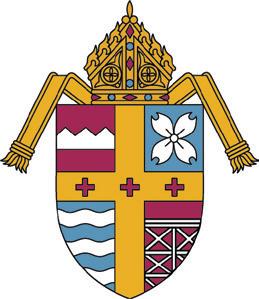


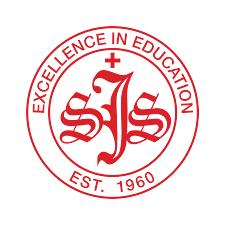
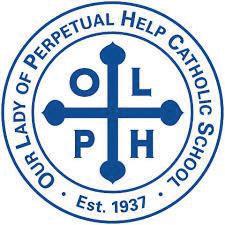


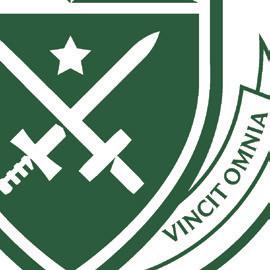


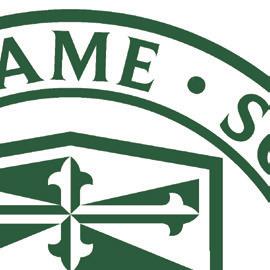

THE EAST TENNESSEE CATHOLIC A12 n AUGUST 6, 2023 www.dioknox.org
Funds are used for tuition, fees, books as well as other educational activities at participating schools Hamilton County Approved Schools What is an ESA? ESA's provide additional school choices to Tennessee families based on where they live and their income Eligibility Families with students entering K-12 who meet the requirements and are currently attending public school Chattanooga, TN Notre Dame High School Lisa Costello costellol@myndhs365.com Our Lady of Perpetual Help Kate Roden kroden@myolph.com St. Jude Kathleen Preston prestonk@mysjs.com For More Information
though you’re not teaching, because of the transition, you have been doing your own share of moving boxes and all that. The job aside, how has moving down to Tennessee been going for you?
MD: It’s been wonderful. My husband and I have been roadies. We drove from West Virginia to Knoxville, unloaded, and then (we’re) kind of fi guring out our way around town. Things have been going well.
JW: What struck you about this diocese, and why did you decide at this point in your career to make the move down here?
MD: Knoxville is a very vibrant area. It is growing. Just seeing the interaction, the people, all the building that is going on, it is an up-and-coming area. I believe it has a great growth mindset, and I am excited to be a part of that. I think “forward thinking” is part of any dynamic that needs to be occurring right now, and there are changes that are happening, and I like change. Change is good.
JW: We’re still a small diocese. We’re a mission diocese. There is a sense of optimism about what can be done, what has been done, and where this diocese might be heading. Clearly, schools are a big part of that equation.
MD: I think there are opportunities for growth, and there are a lot of things going on at the state level through parent choices and being able to take (education funds) with them, and our non-public schools are an option, but more importantly, our Catholic schools are becoming options for that through educational savings accounts and new ways of thinking about educating our children; we’re able to take advantage of that.
I think that our Catholic schools in the Diocese of Knoxville are poised to do that. There is so much growth that can happen, and that is a positive thing. That’s a positive thing for our faith, specifi cally.

JW: The growth in Catholic schools [is] in this part of the country. The numbers aren't good [elsewhere], but here things are really on an uptick, and I know the diocese has been a part of that. One of the things I heard from you when you were speaking to new employees [on July 26], was to ‘ teach Jesus.’ That was one of your opening salvos.
MD: My focus coming in is that we are here to teach Jesus in our Catholic schools. But more importantly, too, is to teach Jesus in preparing souls for the kingdom.
You can go anywhere and get your academics. I kind of said this at the new employee orientation. There are homeschools, there are online schools, there are public schools, there are non-public schools, there are a fl avor-fl av of whatever type of Christian school that you would like, but we are Catholic schools, and our ultimate goal has to be to prepare those souls for the kingdom, and then it’s the athletics, or the academics, or the extra-curricular, and I think that’s what our focus has to be, and it is here in the Diocese of Knoxville.
It is preparing those souls for the kingdom, it’s the infusion of our Catholic faith in every subject area, and everything that we do on and off the fi eld, in the pews at church, in the desk at school. It is ‘teach Jesus’ and prepare our souls for the kingdom.
JW: Can you discuss your superintendent experience, how it started, and what eventually brought you to Knoxville?
MD: I am going to go back a little bit. I went to public schools, and then I came back to Catholic schools. I chose to go into Catholic schools in a superintendency position in the Diocese of Saginaw, Mich. There are seven dioceses in Michigan, and I was in the middle one; it is across the middle of the state.


I was fortunate when I was there that I had a bishop who encouraged me to take on additional leadership roles, so I was also president of the Michigan Association of Non-Public Schools. I wore that hat, which included nonpublic schools of any faith.
After that, I meandered down to West Virginia. That was defi nitely a faith-fi lled mission. I was there for fi ve years. Now I have come here, and I am with the Diocese of Knoxville starting out another career with different tools, and I am going to use those going forward.
JW: You spent seven years in Saginaw and then you transitioned to take the superin-
Essays continued from page A6
love for his flock, he should be recognized as a saint.”
To write the essay, Julian, who is 11, used a number of sources.
“We got a bunch of books and mainly online sources,” Julian said. “There’s a video of Bishop (Richard F.) Stika at a council of bishops, and there was another video of a representative of Tennessee talking about him.”
Julian learned many interesting facts about the heroic priest, but two stood out to him.
“Two main things were that it was dangerous what he was doing because at the time you got $25 if you handed over someone who was taking care of someone with yellow fever
tendent position in the Diocese of WheelingCharleston. As someone who has been through those transitions, how has that helped you prepare for this transition into this diocese?
MD: I come with a lot of different tools to address different needs. It has always been a learning experience. I was with a diocese that had 13 schools and went to a diocese with 24 schools.
I have learned along the way, but I think that’s OK. I think that life is a journey, and it is all about experiences and knowing what you do well and how you can do better. But it is building upon what is in place, and I hopefully have those skills to help people say, “you’re doing this great, but have you thought about this next? Where are you going with it? I can help you with that because this is a little bit of what I did, and let’s see where you can take it.”
JW: Was there something you learned in Saginaw and then in Charleston that you will use now that you have come here to Knoxville?
MD: Sure. I think part of it is helping people to grow in their profession, to help them grow in their faith. So, I think it's steppingstones along the way. I am always about taking people to the next level and helping them to experience life and to be the better person that Jesus wants you to be. I think everyone has their own tool belt, and I’d like to add some tools to their belt for them.
JW: What is it about education that excites you?
MD: It’s the kids, about seeing their potential. When you see their eyes light up when you have done that experiment in science class, or you have the little guy who fi nally ties his shoes by himself, those are important steps along the way. That’s what I get a kick out of.
It doesn’t matter if they’re older kids doing well on an exam or if it’s watching a play and having that shy kid get up there and sing that song and be the lead. That’s what it’s about. It’s about growing these kids and seeing what potential is in them and helping them unlock that along the way.
JW: You have only been on the job for a few days now, but I do want to talk about a few issues with the understanding that you are still getting to know Knoxville, and Knoxville is still getting to know you. Let’s talk a little bit about this diocese and nationwide with what is going on with Catholic schools. You mentioned educational savings accounts. How do you see that playing out, and what role would the diocese have in something like that?
MD: I think it’s great that states are looking at different opportunities for us as taxpayers to be able to have the funds follow the child. I think it’s important having non-public schools, faith-based schools having access to those funds.
I started off in Michigan, and we weren’t able to have the funds follow the kids, but when I was with the Association of Non-Public Schools, we really pushed to have some of those funds used to support programming or teachers that were able to provide services for students. From that step it has evolved a little bit more.
In West Virginia, they had just implemented a program called the Hope Scholarship program in which the funds would follow the children to whatever they wanted to do, including homeschooling. That’s a little bit different than other states. Homeschools may not have been a part of that mix.
Here in Tennessee, what I have seen so far, it’s similar to having the funds follow the children, but it’s county-based, and I think as soon as they get it under their belt and experiment with it a little bit more and fi gure out the bugs
or someone who had yellow fever and hadn’t gone into the mountains or some isolated place. And then the other thing was that the bell that he used, and the one that is now in St. Peter and Paul’s Basilica, was his bell, and it was a second-class relic. Which means that if he gets canonized, the sound waves coming from the bell are third class relics.”
After watching his sister win the same competition last year, Julian was eager to hear about his victory. When asked how he found out he won, he responded, “This is a funny story. So, I was mowing the lawn and Mom got a text from Mrs. Hargett that Anna had won, so Mom decided to check one last time and saw that I won. Then she figures that she
that are always inherent when you start something, I think it is going to go and be almost a state-wide program. We have opportunities... not just for tuition, but other support services. As Catholic schools, we can be that provider of those services, and I think that that’s an opportunity that we need to investigate.
JW: Parents have always been involved in the education of their children. It seems like they have become a little more vocal and a little more assertive. Do you see that in the Catholic school system like we’ve seen it in the public school system, or has it been different?
MD: I think that for parents right now, it’s changing, even from when I was in the classroom 20 years ago. It has evolved. I think parents want to be heard. They’re not as passive. I think that is important.
Parents are the primary educators of their children… that is grounded in everything that we do. I think that it’s nice that it is out there now, that people are listening to that.
JW: Safety is always something that comes up. Anything you can say to ease some minds as we head into the school year?
MD: In fact, at the orientation meeting, we had a lot of resource offi cers there, and that was a pleasant surprise. I haven’t experienced that in my other positions.
I was just reading about how the governor has put out a grant opportunity for our nonpublics, and our schools have applied for that. I am encouraged by that, and we do have safety plans for the schools. So, as I get my feet wet and start seeing what is going on, we’ll have further discussions. It is safety and it is education.
JW: How has the role of superintendent changed over your career?
MD: I think it has changed that there are more opportunities out there and we have to become aware of that. By that, I mean the public sector is supporting our roles in a different way. There are more grant opportunities, so we have to be in tune with that.
We also have to do a lot more on the political side. There is a lot more lobbying that is being done. There is a lot more, not just parent’s voices, but as non-public, faith-based institutions, our voices have to be heard out there, too. Our numbers are growing as far as who we represent, and our voices need to be listened to also.
JW: Is there anything else you would like to comment on?
MD: The message I have is that we prepare souls for the kingdom, and that is our major goal, but we also prepare our kids to move forward. They are global citizens who are prepared to face the challenges that are going to be out there. Our world is changing, and we help them change to meet their needs.
JW: I know that you have met with school leaders, the principals, and the presidents. Have you had an opportunity to get around the diocese yet?
MD: It is getting on the calendar. Within the fi rst month my goal is to go to all the schools, attend Mass at the schools, and meet the staff. I like to be an unannounced presence sometimes, so if you are a principal, I will be showing up at your door (laughs).
JW: Maybe unannounced is good (laughs). They won’t get nervous, and you get a better taste for what’s going on. Good luck with the new school year.
MD: Thank you. I am very excited to see what God has in store for all of us. ■
Listen to this and other episodes of the “ Inside the Diocese of Knoxville ” podcast by visiting https://dioknox.org/podcasts
better not tell me while I’m mowing the lawn or else I’m gonna like, go crazy.”
After waiting through a few distractions, including a nest of baby rabbits, a lawn mower on the fritz, and a phone call, Julian overheard his mom talking on the phone about him winning.
“I’m putting the dogs back outside,” Julian recalled, “and I overhear that I won, so I just ran around the yard screaming.”
With his winnings, Julian invested in new golf equipment. He also hopes to bring a showing of the new movie, “Father Ryan: A Higher Call,” to Holy Ghost so that more people can hear the story of the courageous priest. ■
THE EAST TENNESSEE CATHOLIC AUGUST 6, 2023 n A13 www.dioknox.org
Superintendent continued from page A1
His first presentation, “One Lord, One Faith, One Baptism: How Protestants Are Already Catholic,” reflected on the nature of baptism and how best to serve unbaptized versus baptized people in RCIA.
Mr. Ross read a selection of the Catechism of the Catholic Church from paragraph 1267: “Baptism makes us members of the Body of Christ: ‘Therefore… we are members one of another.’ Baptism incorporates us into the Church. From the baptismal fonts is born the one People of God of the New Covenant, which transcends all the natural or human limits of nations, cultures, races, and sexes: ‘For by one Spirit we were all baptized into one body.’”
“Protestant baptisms, with a few exceptions, are valid baptisms,” Mr. Ross said. “And so, if their baptisms work, the passage I just read from the Catechism applies to them as well. They, too, are baptized into the same Body of Christ, made members of the same Church.”
“Theologically speaking, any Protestant who is baptized is actually baptized into the Catholic Church. Why? Because there is no other church, and there is no other baptism. You’re baptized into the one Body of Christ, which is constituted by the one Church of Christ,” Mr. Ross explained.
“So, in this way, all baptized Protestants are already Catholics… but of course, they are only what the Catechism calls ‘imperfectly united’ into the one Church of Christ. ... One must also believe everything contained in the deposit of faith, as well as submit to the lawful authority," Mr. Ross said.
“Protestants are baptized, but they don’t believe everything contained in the deposit of faith, nor do they submit to the lawful authority. The Eastern Orthodox are baptized and believe, basically, everything contained in the deposit of faith, but they reject the lawful authority, right, the pope. Only in the Catholic Church does one find the fullness of the Christian religion, fullness of sacraments, fullness of faith or belief, and fullness of authority. Nevertheless, the dignity imparted at baptism is not lost on Prot
estants. We can affirm both of those things: they are imperfectly united, but they are united,” he added.
Mr. Ross noted that in addition to RCIA classes at the basilica, there is a separate track called mystagogia.
The RCIA group contains unbaptized and baptized people, while the mystagogia group contains those who are baptized and evangelized and catechized.
“One of the great benefits to what I’ll now refer to as the mystagogia program or mystagogia track is that it can be tailored to the unique needs of the evangelized and catechized,” Mr. Ross said.
He shared with the catechists that there is no requirement that baptized Christians wait until the Easter Vigil to come into the Church.
“It appears that the Church even deems it preferable to receive these candidates as soon as they’re disposed,” he said.
Mr. Ross asked the crowd how that would look in a practical parish setting: Could there be multiple times during the year for confirmations? Could the overall timeframe commitment be shorter for those candidates who are more prepared?
For the mystagogia track at the basilica, Mr. Ross created a curriculum for two-hour classes over a span of 12 weeks. There are three cycles per year, with a month break in between.
Mystagogia differs from the traditional RCIA classes in both timeframe and length of topics. There are challenges, as well, such as integrating the candidates into parish life in a smaller timeframe, and a separate mystagogia track can require more time from staff or more staff in general.
“We have had a great success with the mystagogia program at the basilica,” Mr. Ross shared. “In four cycles, as I mentioned, we have taught 44 people, all of whom who were received into full communion.”
“My hope now is that we can all take these ideas, pray on them, and discern together how best to show Christ to everybody, meeting people where they’re at,” he said.
The indissolubility of marriage
Mr. Ross’ second presentation was titled “The Hardness of our Hearts: Becoming Catholic without a Declaration of Nullity.”
He began his talk by saying that if a person approaches RCIA with real faith and a sincere repentance of all their sins, there are no circumstances in which they should be turned away.
“What keeps people from becoming Catholic?” he asked. “One place we can start is the profession of faith… ‘I believe and profess all that the Holy Catholic Church believes, teaches, and proclaims to be revealed by God.’ If someone can make this profession
of faith, one can be Catholic. Or to say it a different way, if someone is going to become Catholic, they need to be able to say this. They need to believe as the Church believes.”
“If the Church expects this kind of faith of anyone desiring to become Catholic, not to mention everyone who is Catholic, then all who make this profession must be able to adhere to the Church’s teaching on mar
riage, divorce, and remarriage,” Mr. Ross continued. “If someone cannot make this profession of faith, one cannot sincerely, at least, be Catholic. The alternative is socalled cafeteria Catholicism… I’ll take a little bit of this, a little bit of that, I’ll leave that. A faith that picks and chooses what to believe is not divine faith but rather human opinion.”
Mr. Ross discussed the Church teaching on the indissolubility of marriage, quoting Scripture from Romans 7 and Mark 10.
“What is important to note here is that being unable to dissolve a marriage bond is what Jesus is pointing out is how marriage was from the beginning,” he said. “This means that today, no matter the country or religion or beliefs of the parties, if they get married, they are establishing a bond that is dissolved, as Paul says, by death alone.”
“If then the parties attempt to divorce to get remarried, what they are actually doing, per our Lord and Paul, is committing adultery,” he continued. “On the most fundamental level, even if all parties involved think they aren’t, or even if all parties involved are OK with the new union, they actually are committing adultery. Our opinion on whether something is a sin doesn’t change the fact that a given action is a sin, though it might lessen our culpability for it. Not knowing that something is a sin might mean you’re not guilty of it, but that doesn’t mean you didn’t do something wrong.”
Mr. Ross discussed his work as a judge in the diocesan marriage tribunal, where he interviews parties and their witnesses every day.
“When people make the statement, I need an annulment to become Catholic, it implies I as a tribunal judge am either the one preventing them from becoming Catholic because of rules or I’m somehow making them persist in their adultery, and neither of which I am doing,” he shared.
“So, what am I dancing around saying here? Well, it’s good news and bad news,
depending on how it’s received. The good news is no one has to wait for a declaration of nullity in order to become Catholic. The bad news is the sin preventing such a person from becoming Catholic will require them to believe with faith that their current civil spouse is not their real spouse in the eyes of God, and to behave accordingly,” he continued.
Mr. Ross acknowledged the difficulty in having this type of conversation with RCIA participants, but he said there are some useful tactics involved in delivering the message.
“If you have the luxury of working with a group of Protestants, you can appeal to Scripture,” he said. “In no less than five places in Scripture does the Holy Spirit, through the human authors, teach us that anyone who divorces his wife and marries another commits adultery, and vice versa.”
“If on the other hand you’re dealing with the unchurched, it can become a bit more involved. I always simply start by telling people that Catholics believe that marriage is for life, and most people when they hear that will say ‘yeah, sure, everybody believes that.’ To which I will then usually respond, well for us though, once the spouses make their vows and say till death do us part, death alone does the part. ‘So, I can’t end my own marriage?’ No, you specifically said you wouldn’t. So that’s one approach.
“Another approach I take, usually following upon that, is to help them understand why we believe God made marriage this way in the first place. This is a tactic that can work on unchurched people as well as churched people,” Mr. Ross said.
Mr. Ross tries to first talk about marriage and indissolubility before getting into the issue of divorce and remarriage, allowing the candidates and catechumens an opportunity to come to conclusions on their own.


“So, the baseline expectation for these people, as with the rest of the people in RCIA, is to assist them in believing with faith all that the holy Catholic Church believes, teaches, and proclaims to be revealed by God,” he continued. “In the case of the divorced and remarried, it implies an acceptance of their objective state before God and a legitimate repentance, which includes a willingness to turn from the sin in which they find themselves. And this really is the only prerequisite to become Catholic, right, repent and believe.”
Mr. Ross brought up the case for annulments.
“As long as the couple is presumed to still be married to their original spouses, any romantic relationship will be adultery. But what if we can overturn that presumption? What if we can prove that the original marriages were invalid? If we can do that, then we can allow the parties to now finally get married. So, there is a possible way out, but please note, it is their own choice to take on a life of continence, which can prevent them from becoming Catholic, not a declaration of nullity.”
He also mentioned that a declaration of nullity is never a guarantee.
“It’s certainly possible that the invalidity of the previous marriage is not proven, and if it can’t be, are we to prohibit these people from joining the Church forever? No, by no means. Notice here that it is the declaration of nullity that is the fallback option, if you will. Most of us are probably operating in the reverse, neglecting to call and invite these people into the continence that Jesus is calling them to, telling them to get the annulment and only bringing up continence after they can’t make their case for nullity. That’s backwards. We have a duty as catechists to share with people the good news, which includes the good news of the indissolubility of marriage. And if we neglect to do that out of fear, their sin becomes our sin, too.
“What do we make of the parties who refuse to acknowledge their state and behave accordingly? Well, to put it simply and bluntly, they appear not to believe, I would say even to reject, what our Lord says about marriage and how He calls us to live. And as we discussed earlier, this scenario is the only one in which the Church would prohibit someone from becoming Catholic,” he said.
Mr. Ross acknowledged that the Church’s teaching is hard to hear and to teach.
“This is a hard teaching to hear, and a hard heart might be easy to come by if you’re the one being told all of this in RCIA. On the other hand, it’s also a hard teaching to teach, and a hard heart might be easy to come by if you’re afraid of the reactions you might get,” he said.
“If we’ve done our jobs well in RCIA, we would be teaching them that the Catholic Church is necessary with all the proper qualifications,” Mr. Ross continued. “But if
THE EAST TENNESSEE CATHOLIC A14 n AUGUST 6, 2023 www.dioknox.org
-
-
Discussion leaders Top: Tyler Ross, a judge for the diocesan tribunal, leads a presentation about catechizing on Catholic marriage. Bottom: Deacon Bill Jacobs makes a point in his presentation at St. Thomas the Apostle Church in Lenoir City.
RCIA continued from page A10 RCIA continued on page A16
GABRIELLE NOLAN (2)
Commit ted to Catholic Education
2023




"There is an incomprehensible comfort to be able to send your children to a school that offers consistent exposure to Christ, mirrors what is being taught at home, and weaves the love of God into the very fabric of everything taught each day.
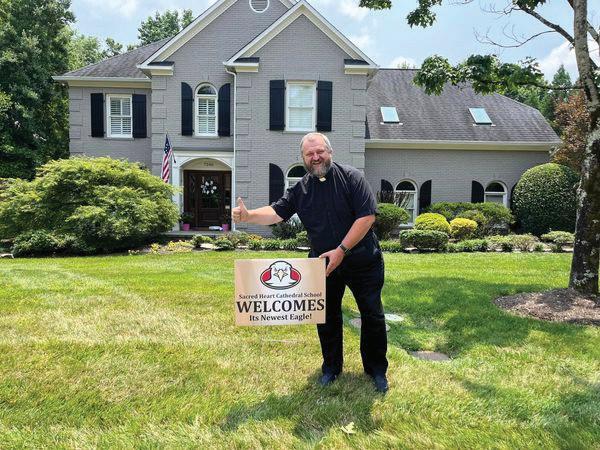
One where teachers and leaders are moral role models and encourage children to understand the world and their actions as extensions of God’s presence within themselves. These are gifts freely given and poured bountifully into our children by schools in the Diocese of Knoxville. "
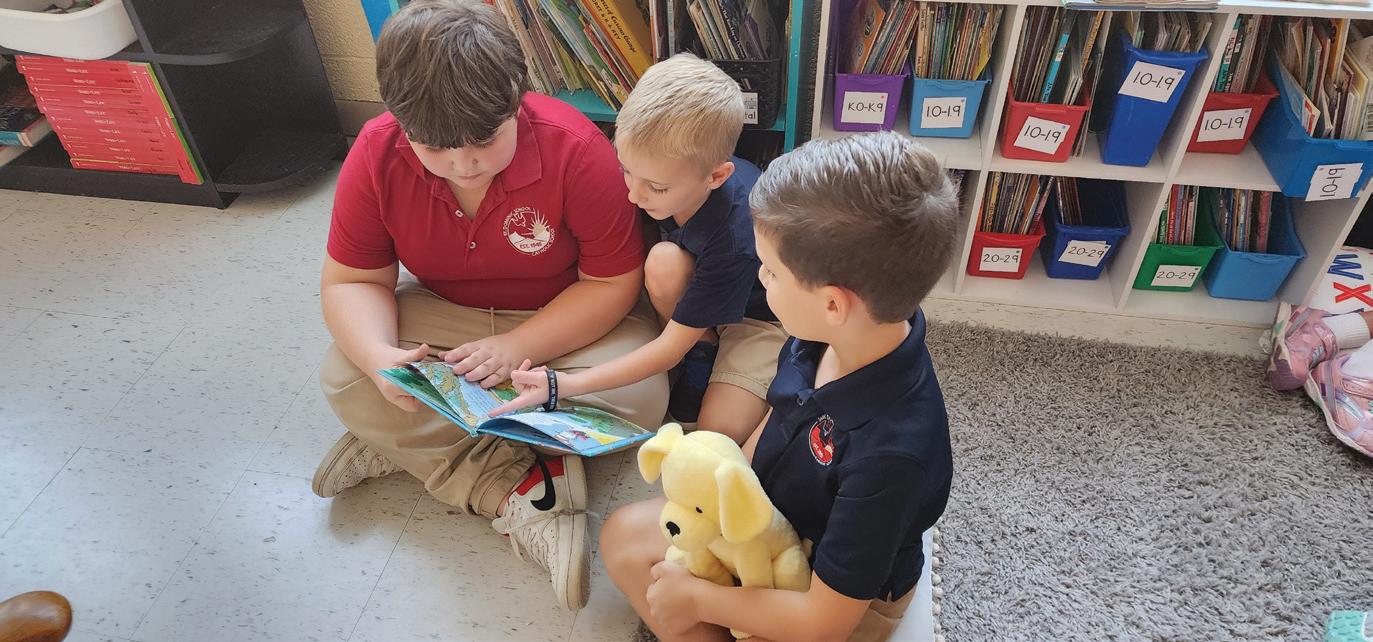
Your Commitment Changes Lives
Commit to changing lives with your donation by visiting: or scanning the QR code

https://dioknox.org/schools-collection
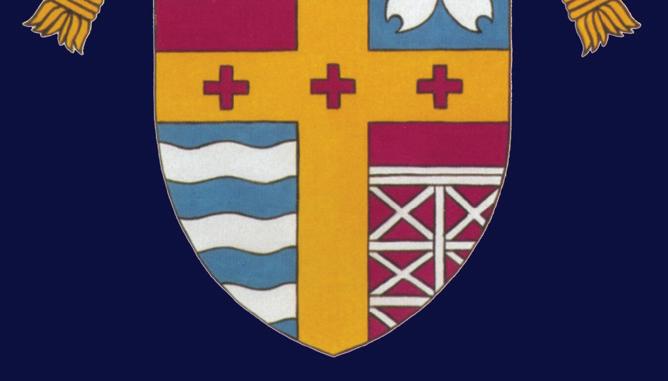









Catholic Schools Second Collection weekends: August 12-13 & November 11-12
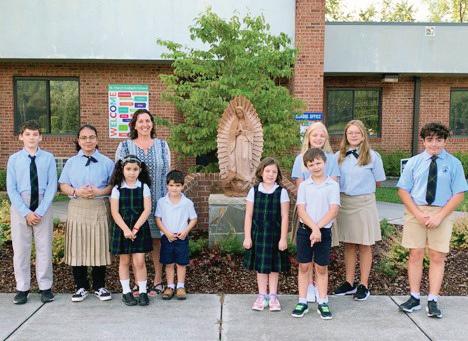

THE EAST TENNESSEE CATHOLIC AUGUST 6, 2023 n A15 www.dioknox.org
-Parent of children currently receiving tuition assistance through the generosity of donors like you.
Crunching the data
Deacon David Duhamel armed with information as he leads schools' sustainability
By Jim Wogan
Deacon David Duhamel is aware of the expectations that come with his new job.

Among the lessons that came with battlefield leadership and a 20-year career in the U.S. Marine Corps, and the accomplishment of earning a master’s degree in business administration and turning that into another career in corporate leadership, the deacon has earned his stripes in more ways than one by adapting to challenges.
In May, Deacon Duhamel stepped away from the corporate world, leaving his position in international transportation security at Oak Ridge National Laboratory for a chance to lead the Diocese of Knoxville in areas that include strategic planning, training, and school sustainability.
During an interview prior to the start of the new school year, he reflected on his background and experience, and how those fit into plans the diocese has for this new position.
“Working with my combat experience, a high-stress environment, and being able to adjust on the fly, not being married to a single plan, and having worked with so many different cultures and so many different people in my project work at the Oak Ridge National Lab, I have seen a lot
and done a lot. Those are experiences that may not be directly transferable, but the skills you develop in those situations are skills that are absolutely transferable to church work,” he said.
Deacon Duhamel, who serves in ministry at St. Mary Parish in Oak Ridge, will work alongside new diocesan schools superintendent Mary Ann Deschaine to address school issues like enrollment, admissions, and future sustainability.
“At the school level, I am just starting to peel away at the very basic level of data as it relates to budgets,” Deacon Duhamel said.
“From a sustainability aspect,
we’re also telling them that they cannot enter the Church because of their marital state and not giving them any solutions to fix it, we are effectively permanently banning someone from grace, and finally from salvation. This constitutes a serious abuse.”
“Similarly, using annulments as a scapegoat is another abuse. I’m talking about those situations where we say, ‘you need an annulment before you become Catholic,’ and then we allow them to persist in their adultery. They are able to get the required annulments, but they never repented of their state the whole time. As an RCIA catechist I’ve solved the practical problem, but I haven’t actually helped bring about a true conversion. That person is still in the dark about marriage, divorce, and remarriage and how that all relates to Jesus and the Church and the indissoluble new covenant,” he added.
Mr. Ross concluded his presentation with a final question: Is the Eucharist worth it?
“As catechists, we should be able to help them answer that question correctly, with tact and great love,” he said.
“We anticipated that Tyler’s expertise as a canon lawyer and catechist would stir the interest of our parishes,” Deacon Bello shared. “Each of his presentations was designed to encourage those seeking full communion in the faith to experience evangelization and learning as a more welcoming, and in many cases, expedited journey into the beauty of Catholicism. Tyler took some very difficult material and presented it in a way that was thorough but practical.”
Seeking the Catholic faith
Deacon Bill Jacobs of Our Lady of Fatima Parish in Alcoa led a presentation titled “Before the Beginning and After the End: Matters of Inquiry and Mystagogy for RCIA Catechists.”
Deacon Jacobs discussed the challenges and opportunities of encountering faith-seekers after the RCIA program is well underway.
“We all recognize that the Holy Spirit inspires individuals, and people respond to those inspirations at unpredictable times,” he said.
“It is important to note that while this seeker moment, right, from the moment they call the parish, it may mark the formal start of their initiation, but it’s not the beginning of their faith journey,” Deacon Jacobs continued, noting that each seeker has a lifetime of experience and is on a journey.
“These experiences have eventually led to the gift from the Holy Spirit of the strength and the courage to make the phone call. So, recognizing that it is that action of the Holy Spirit that drives our seekers to us, and we must respond in kind, not with a registration form or a stack of papers, not with a date for when the next sessions will start,” he said.
“Whoever greets this seeker must greet
those are the areas that I am interested in, but it’s very much in the infancy stage. We can look at where we are gaining efficiency or where we are not gaining. Can we look at some good practices to share among (all the schools)?”
Enrollment in kindergarten through 12th grade increased almost 3 percent at Catholic schools in the diocese in the 2022-23 academic year, but the trend in Catholic education nationwide is different.
The National Catholic Education Association says that school enrollment across the country is down 2.6 percent since 201920. Schools in the Southeast are
them as Christ would greet them. Unfortunately, time, malaise, and bureaucracy have a tendency to rule our parish offices and staff. You and I can be overburdened with the weekly grind of teaching and coordinating RCIA. More often than not, seekers aren’t greeted by Christ but with a form to fill out. We need to begin the initiation process not with forms and paperwork and schedules, but with simple conversation. It is all about personal contact. This contact is absolutely invaluable in order to demonstrate to these seekers our faith and the excitement that we feel in hearing that they want to join our faith community,” he added.
Deacon Jacobs suggests that, after the seeker contacts the parish, parish-office staff offer a solution to welcome them, no matter where the parish ’ s RCIA program is on its timeline
The first option: continue one-on-one with the seeker.
“Pair up a seeker with a trusted and available parishioner. This person could get to know the seeker and discuss things about the Catholic faith periodically with them until a formal inquiry opportunity becomes available,” he said. “Conversely, a married couple or another group of individuals could invite a seeker and their spouse to join them for dinner on a bi-weekly or monthly basis. Again, these would be informal sessions by design. This also affords an opportunity to assess the seeker’s needs and determine the best way to serve them going forward.”
Option two: have monthly inquirer drop-in sessions.
“A priest or deacon or competent layperson or RCIA team member could field questions or offer a short presentation on an element of our faith, nothing too heavy yet. Give a personal testimony or lead a reflection on a fitting Scripture passage. This could be an evening once a month. … Potential sponsors could be invited to those same sessions and eventually paired up with the seekers who progress in the process. Parishioners who are looking for some way to introduce their friends or their coworkers to the faith might welcome this as a no-commitment event to which their non-Catholic context could be invited on an ongoing basis.”
Option three: providing good books for the seeker to read.
“Now I bet you could think of lots of introductory titles that might help spur a seeker to know more about the faith, but you shouldn’t just hand them that book and say see you in September,” Deacon Jacobs said. “You should ask them to periodically visit with a priest or deacon or a competent layperson for discussion on what they read in the book.”
Option four: invite the seeker to plug into existing parish programs.
“Consider other parish programs like adult-ed classes, book studies, Bible studies already going on in the church,” he said.
showing growth, but the NCEA says most of that growth is driven by an increase in enrollment in North Carolina, South Carolina, and Virginia.
Enrollment and admissions are just part of the equation. Last year, the Diocese of Knoxville and its parishes provided almost $5 million in tuition assistance for families. That’s a financial stress that the diocese and its parishes are willing to embrace, but is it sustainable?
“The diocese hasn’t been as effective as a support mechanism as I think it should be,” Deacon Duhamel said. “Do (the parishes and schools) need us right now? No, but it’s not going to get any better. What they are going to find is that they are going to squeeze as much as they can out of what they’ve got, but they might not know where else we can be looking.
“We are too small of an organization not to look for areas where we can be a lot more efficient. We don’t have the resources to waste. The data allows us to be more efficient with whatever resources we are given. We can try trial and error to a certain extent, but there is a cost to that.”
During his military and civilian career, Deacon Duhamel visited 72 countries and managed the scope, schedule, and budgets for more than 30 international
Deacon continued on page A22
“Men’s groups, women’s groups, they often start at different times during the year, so you can invite the seeker. … Be sure to give a heads up to the program coordinators.”
Option five: playing “catch up.”
If the seeker is baptized and well catechized, there may be an opportunity to catch them up on all that has happened in the RCIA class.
“Now the problem with using the catch-up approach is it’s easy to rush a person through that material without allowing proper time for reflection and conversion, and it also may be logistically difficult for you because you know, people gave talks the last three months… so it may not be easy to play catch up,” Deacon Jacobs shared.
Lastly, Deacon Jacobs invited the catechists to consider how they might serve their catechumens and candidates after the Easter Vigil.
“If the Holy Spirit has influenced these new Catholics through the catechumenal process, and if we have done our jobs well, they’re excited to grow further in the faith and to explore the faith more deeply,” Deacon Jacobs said. “In addition, we have spent time in the formation process not only teaching them but also forming them into a community, a community that is worth sustaining and continuing to foster after the Easter Vigil.”
He encouraged catechists to invite those newly entered into the Church to their parish’s first Communion and confirmation Masses, as well as communal penance services, infant baptisms, and the Sending of the Neophytes Mass at the cathedral.
Deacon Jacobs praised the RCIA catechists in attendance.
“I want to say that I don’t think that all of you get enough acknowledgement for the great work that you do with RCIA, it’s sometimes a thankless job. … Many souls come to experience the richness of our Catholic faith through your efforts,” he said.
Deacon Bello said that “any conversation with Deacon Bill is sure to be entertaining and informative. His energy during the start of his presentation paved the way for some great information designed to help our catechists and parishes anticipate and navigate some common obstacles before, during, and after the normal RCIA cycle. Deacon Bill's presentation was well-received, practical, and will be useful in many ways as we prepare to launch our RCIA Programs in August and September.”
“This conference was assembled for the purpose of helping our RCIA coordinators and catechists provide a more welcoming and efficient program for those seeking to learn more about this beautiful Church,” Deacon Bello continued. “Both Tyler Ross and Deacon Bill Jacobs did exactly that. I believe these presentations will be beneficial to each parish to cooperate with the Holy Spirit and continue our diocesan growth in faith and number.” ■
THE EAST TENNESSEE CATHOLIC A16 n AUGUST 6, 2023 www.dioknox.org
JIM WOGAN
Identifying education efficiencies Deacon David Duhamel, new Diocese of Knoxville vice chancellor for strategic planning, training, and school sustainability, analyzes data in his office in the Chancery
RCIA continued from page A14
Growth of U.S. Catholic schools is slowing Two years of notable increases are followed by just a slight rise
By Jonah McKeown Catholic News Agency
Following two straight years of notable growth, Catholic school enrollment rose again slightly nationwide in 2022-23, according to new data made public by the National Catholic Educational Association (NCEA).
The NCEA, which gathers statistics on U.S. Catholic school enrollment each year, reported that Catholic school enrollment grew by 0.3 percent last year to a total of 1,693,493 students in 5,920 schools.
However, Catholic school enrollment remains below prepandemic levels.
The increase for the 2022-23 school year is small but follows a trend of several years of growth that began after the start of the COVID-19 pandemic.
Enrollment dropped sharply in the early stages of the pandemic, falling 6.4 percent from 2019-20 to 2020-21—the largest
portive, all the way from local priests hearing confessions for our participants and them allowing us to join them for Mass all the time, all the way down to Scott and the facility people and Rick [Grinstead] the youth minister, everybody has just been really great.”
“We switch a lot of our locations, but we always come back [to Sacred Heart] because everybody here’s just so supportive,” Mr. Weir continued. “We’re on the road all summer, it almost feels a little bit like you’re home, you know, because we’re going to be here for a week, and it’s just so familiar and to just see familiar faces that really believe in what we’re doing is pretty awesome, and that’s why we come back each year.”
Helping Mr. Weir with the camps during the summer is a staff of 10, along with a four-person band. Youth groups also come with additional adult chaperones. Knoxville’s camp saw 16 different youth groups, with some ranging from as small as five teenagers all the way up to 40 teens.
A typical day at the camp includes morning and evening sessions of praise and worship, daily Mass, service projects, free time, witness talks, parish time, and games.
Service projects took place at locations such as Horse Haven, Salvation Army, KARM stores, Young Williams Animal Center, Family Promise, and more.
The theme of the camp was “Ascend,” focusing on the gift of fortitude.
“Last summer we did a theme where we focused particularly on Pentecost, and so we were kind of continuing with the Holy Spirit theme, so we’re honing in on the gift of fortitude and just using that to kind of help young people understand that we have these gifts that are given to us that we can use, to be able to overcome and you know, ascend if you will, over things, difficulties in our life,” Mr. Weir shared.
“Some of our themes for the day are ascend over fear, ascend over suffering, and things that all of us face, and just being able to use the gifts of the Holy Spirit, this virtue of fortitude and then also our community, our relationship with God to help us to rise above some of these challenges in our life and things like that,” he continued.
Assistant youth minister Augie Jellie brought her youth group from Vero Beach, Fla., with the organization Youth on a Mission.
“This is the first time for a lot of these kids. We, as Youth on a Mis -
decline in the 50 years since the NCEA started collecting enrollment data.
The numbers rebounded in the 2021-22 school year, reaching record levels in some dioceses.
Nationwide, Catholic enrollment jumped from 1.63 million to 1.69 million, an increase of more than 3.5 percent, the NCEA reported. Though the statistics show that enrollment has not yet reached pre-pandemic levels—1.74 million students enrolled in 2019—
the reversal is notable, as before the pandemic enrollment was trending down by 2 percent to 3 percent annually.
A deeper analysis of the numbers suggests the trend of growth may continue, the NCEA said.
Pre-kindergarten enrollment is up by 1 percent compared with before the pandemic, which the NCEA said is a predictor of future Catholic school growth. “In every region except the Mideast and Great Lakes, early child -
hood enrollment increased from 2019-20 to 2022-23, a positive sign of the long-term viability of Catholic schools should they retain these students in kindergarten and beyond.”
In addition, Catholic schools across the country retained 82 percent of principals and 86 percent of teachers in the 2022-23 academic year, NCEA said. “The relatively high retention amidst the added pressure of the nationwide educator shortage indicates Catholic school teachers and principals feel supported in their roles,” the report stated.

More than 100 Catholic school closures and mergers took place during the pandemic, most of them elementary schools. Despite that time of difficulty, NCEA’s data shows that the number of school closures and mergers has gone back down, even to below-typical levels.
“Excluding the immediate aftermath of the COVID-19 pandemic, on average, approxiNCEA continued on page A18
faith” because of the camp.
“This is my first time going to Mass six days in a row, and every day it was just really eye-opening. And then also I went to confession, and we also had adoration, so being able to do all of those in one week just really helped me get what I needed to get in this moment from God,” she said Abigail shared that she enjoyed being with hundreds of kids from around the country.
sion, have been coming for more than 10 years,” she said. “It’s just so important to get them to a place where there are so many other Catholic youth around them, and they have an opportunity to kind of be put out of their comfort zone, not at home, and they have the chance to go and serve the community. They get to spend the week with other amazing people. They get to spend the week meeting other people from their age from across the country that came here to do the same thing.”
Ms. Jellie’s favorite part of Alive in You is the overall program.
“We’ve gone to a couple of different organizations for camps, and I really like how Alive in You does the program and really engages with the kids, and their witness talks, I think, are very well put-together in terms of bringing it down to the kids’ level and making it really relatable for them,” she said.
Ms. Jellie also believes the Catholic camp helps her own faith journey.
“I love getting to see the kids’
connections that they form, and I think it helps train me in the sense of having grace because teenagers are teenagers, and they mess up over the course of the week, small mess-ups, big messups, whatever. We teach them that we can make mistakes, life is about forgiveness, and we need to be able to move past mistakes and make better choices next time. So, it helps train me and my patience and my grace, and I ask God for help with that when I’m here, so it just grows me closer as well.”
Bianca and Abigail, two 17-yearolds from the Archdiocese of Atlanta, said their favorite part of the week was their service day at The Muse Knoxville, a children’s science, technology, engineering, arts, and math museum
“Our service project was to go to this children’s museum and help them out there, and I really like kids,” Bianca said.
“I just liked interacting with kids and seeing them have the creative mindset that they have and just having different roles combined,” Abigail shared.
Bianca believes she has “definitely grown as a person in my
“I made tons of friends; I have friends now that I will never forget about; I have relationships I will never forget about. It’s always something that whenever I come to these kinds of retreats, it’s always something that stays close to my heart, and I always remember the people,” she said.
Mr. Weir noted that at each camp there is normally a turning point where “you just kind of start to see the walls come down and people kind of buy in to what’s going on and to really understand what it is we’re doing and why we’re doing it.”
“We’ve had kids over the years, youth ministers tell us, that you know this one kid was kicking and screaming coming here, they didn’t want to come, their parents were forcing them, and by the last day they were the ones who were up there thanking us for running this kind of an event and letting us know that it was really impactful and life-changing for them. So yeah, we really do see a lot of transformation in our participants over the course of the week,” he observed.
Father Mark Wajda, an Orlando, Fla., priest, brought a group up from his parish and celebrated the closing Mass on July 2 at the Cathedral of the Most Sacred Heart of Jesus. He also witnessed a transformation in the kids during the week at Alive in You.


“It’s amazing to see them come in, well first of all, especially a group this size, nobody knows anybody, it’s all a little strange. But you can see them starting to get a little more on fire for their faith, in the small groups, in the large group in the talks that they have, the witness talks and all that kind of stuff. You can see the wheels turning… obviously within your own group, you see that spark… ‘I can be Christian and still be a teenager.’ It’s amazing,” he said.
“Seeing 300 kids growing, I get choked up about it. It really is amazing to be able to walk with them on a journey, even with some of them it’s only a week. It grabs my heart,” Father Wajda said.
For more information on the Alive in You camps, visit aliveinyou.com ■
THE EAST TENNESSEE CATHOLIC AUGUST 6, 2023 n A17 www.dioknox.org
COURTESY OF PIXABAY
Alive in You continued from page A4
GABRIELLE NOLAN (2)
Youth fellowship Nearly 300 teens gathered for nightly fellowship in Sacred Heart's Cathedral Hall during the Alive in You Summer conference.
Aging gracefully Teens taking part in the Alive in You Summer Conference participate in a contest of dressing like the elderly. The conference was held on the campus of Sacred Heart Cathedral from June 27-July 2
mately 100 Catholic schools close or consolidate each year. At the end of the 2021-22 school year, 44 Catholic schools closed or merged. … The current positive trend in Catholic school enrollment may enable a continued trend of fewer school closures or mergers,” the NCEA reported.
Polling by CNA’s parent organization, EWTN, shows that Catholic parents largely back initiatives to support school choice, with two-thirds of Catholic parents surveyed last year saying they support a policy that allows students to make use of public education funds for the schools or services that best fit their needs.
The NCEA data showed that overall, 10.5 percent of Catholic school students use a parental choice program, and 27.6 percent of Catholic schools enrolled students using parental choice
Creation continued from page A3
beating: the maternal heartbeat of the earth. Just as the hearts of babies in the womb beat in harmony with those of their mothers, so in order to grow as people, we need to harmonize our own rhythms of life with those of creation, which gives us life.’ [1]
“ During this Season of Creation, let us dwell on those heartbeats: our own and those of our mothers and grandmothers, the heartbeat of creation and the heartbeat of God. Today they do not beat in harmony; they are not harmonized in justice and peace. Too many of our brothers and sisters are prevented from drinking from that mighty river. Let us heed our call to stand with the victims of environmental and climate injustice, and to put an end to the senseless war against creation.
The effects of this war can be seen in the many rivers that are drying up. Benedict XVI once observed that: ‘ the external deserts in the world are growing, because the internal deserts have become so vast. ’ [2] Consumerist greed, fueled by selfish hearts, is disrupting the planet’s water cycle. The unrestrained burning of fossil fuels and the destruction of forests are pushing temperatures higher and leading to massive droughts. Alarming water shortages increasingly affect both small rural communities and large metropolises. Moreover, predatory industries are depleting and polluting our freshwater sources through extreme practices such as fracking for oil and gas extraction, unchecked mega-mining projects, and intensive animal farming. Sister Water, in the words of St. Francis of Assisi, is pillaged and turned into ‘ a commodity subject to the laws of the market ( Laudato si’ , 30).
“The United Nations Intergovernmental Panel on Climate Change has stated that acting now with greater urgency means that we will not miss our chance to create a more sustainable and just world. We can and we must prevent the worst from happening. Truly, much can be done (ibid., 180), provided we come together like so many streams, brooks, and rivulets, merging finally in a mighty river to irrigate the life of our marvelous planet and our human family for generations to come. So let us join hands and take bold steps to ‘ Let Justice and Peace Flow throughout our world.
“ How can we contribute to the mighty river of justice and peace in this Season of Creation? What can we, particularly as Christian communities, do to heal our common home so that it can once again teem with life? We must do this by resolving to transform our hearts, our lifestyles, and the public policies ruling our societies.

“ First, let us join the mighty river by transforming our hearts. This is essential for any other transformation to occur; it is that ‘ ecological conversion ’ which St. John Paul II encouraged us to embrace: the renewal of our relationship with creation so that we no
programs. In some states, such as Arizona and Indiana, nearly all of the state’s Catholic schools take part in school choice.
“Expansion of parental choice programs has long been viewed as a way to support parents as the primary educators of their children. Thirty-two states and the District of Columbia offer school-choice programs, all of which vary in terms of their funding mechanisms and criterion,” the NCEA reported.
“Iowa and Utah, both of which already had programs, recently expanded school choice to include more families across the states. Catholic schools should work together to support expansion of parental-choice programs across the nation,” the report continued.
Arizona’s steady expansion of these benefits culminated in a universal K–12 school voucher
program that took effect last fall. Under the program, all of the state’s 1.1 million schoolchildren will have access to an Empowerment Scholarship Account (ESA) that provides approximately $7,000 per child that families can use for tutoring, private school tuition, at-home curricula, special-needs therapies, and other education expenses.
Dissatisfaction with several aspects of public education may help explain why Catholic schools are enjoying an increase in enrollment nationwide.
The EWTN News/RealClear Opinion Research poll last fall found that 74 percent of Catholic voters are concerned about children suffering from an educational “COVID deficit” caused by the shift to online learning during the pandemic. Seventeen percent said they were not concerned, and 10 percent said they
were not sure.
EWTN’s polling also revealed concerns among Catholics about the quality and content of education at public schools. Nearly 47 percent of respondents with children in public school said they have considered, in the past year, moving their children from a public school to a private or parochial school because of concerns about the quality of the education received.
Several educators CNA spoke with cited Catholic schools’ emphasis on a quick return to in-person learning during the COVID shutdown, the high quality and Christ-centeredness of the education provided, and an emphasis on partnering with parents in the education of their children as contributing factors in parents’ decisions to switch from public schools since the pandemic. ■
longer see it as an object to be exploited but cherish it instead as a sacred gift from our Creator. Furthermore, we should realize that an integral approach to respect for the environment involves four relationships: with God, with our brothers and sisters of today and tomorrow, with all of nature, and with ourselves.
As to the first of these relationships, Pope Benedict XVI spoke of the urgent need to recognize that creation and redemption are inseparably linked: ‘ The Redeemer is the Creator, and if we do not proclaim God in his full grandeur as Creator and as Redeemer we also diminish the value of the redemption. [3] Creation refers both to God’s mysterious, magnificent act of creating this majestic, beautiful planet and universe out of nothing and to the continuing result of that act, which we experience as an inexhaustible gift. During the liturgy and personal prayer in ‘ the great cathedral of creation, ‘ [4] let us recall the great Artist who creates such beauty and reflect on the mystery of that loving decision to create the cosmos.
Second, let us add to the flow of this mighty river by transforming our lifestyles. Starting from grateful wonder at the Creator and His creation, let us repent of our ‘ ecological sins, ’ as my brother, Ecumenical Patriarch Bartholomew, has urged. These sins harm the world of nature and our fellow men and women. With the help of God’s grace, let us adopt lifestyles marked by less waste and unnecessary consumption, especially where the processes of production are toxic and unsustainable. Let us be as mindful
as we can about our habits and economic decisions so that all can thrive our fellow men and women wherever they may be, and future generations as well. Let us cooperate in God’s ongoing creation through positive choices: using resources with moderation and a joyful sobriety, disposing and recycling waste, and making greater use of available products and services that are environmentally and socially responsible.

“ Lastly, for the mighty river to continue flowing, we must transform the public policies that govern our societies and shape the lives of young people today and tomorrow. Economic policies that promote scandalous wealth for a privileged few and degrading conditions for many others, spell the end of peace and justice. It is clear that the richer nations have contracted an ‘ ecological debt’ that must be paid (cf. Laudato si’ , 51). [5] The world leaders who will gather for the COP28 summit in Dubai from Nov. 30 to Dec. 12 next must listen to science and institute a rapid and equitable transition to end the era of fossil fuel. According to the commitments undertaken in the Paris Agreement to restrain global warming, it is absurd to permit the continued exploration and expansion of fossil fuel infrastructures. Let us raise our voices to halt this injustice towards the poor and towards our children, who will bear the worst effects of climate change. I appeal to all people of goodwill to act in conformity with these perspectives on society and nature.
Another parallel perspective has to do with the Catholic Church’s commitment to synodal -
ity. This year, the closing of the Season of Creation on Oct. 4, the feast of Saint Francis of Assisi, will coincide with the opening of the Synod on Synodality. Like rivers in nature, fed by myriad tiny brooks and larger streams and rivulets, the synodal process that began in October 2021 invites all those who take part on a personal or community level, to coalesce in a majestic river of reflection and renewal. The entire People of God is being invited to an immersive journey of synodal dialogue and conversion
“
So, too, like a river basin with its many tiny and larger tributaries, the Church is a communion of countless local churches, religious communities, and associations that draw from the same shared waters. Each source adds its unique and irreplaceable contribution, until all flow together into the vast ocean of God’s loving mercy. In the same way that a river is a source of life for its surroundings, our synodal Church must be a source of life for our common home and all its inhabitants. In the same way that a river gives life to all kinds of animal and plant life, a synodal Church must give life by sowing justice and peace in every place it reaches.
In Canada in July 2022, I spoke of the Sea of Galilee where Jesus brought healing and consolation to many people and proclaimed ‘ a revolution of love. ‘ Lac Ste. Anne, I learned, is also a place of healing, consolation, and love, a place that ‘ reminds us that fraternity is genuine if it unites those who are far apart, [and] that the message of unity that heaven sends down to earth does not fear differences, but invites us to fellowship, a communion of differences, in order to start afresh together, because we are all pilgrims on a journey.’ [6]
“ In this Season of Creation, as followers of Christ on our shared synodal journey, let us live, work, and pray that our common home will teem with life once again. May the Holy Spirit once more hover over the waters and guide our efforts to ‘ renew the face of the earth’ (cf. Psalms 104:30). ” ■ Mary Tankersley is a parishioner at Our Lady of Fatima in Alcoa and helps lead the Care for Creation Ministry there. Denise Clark is a parishioner at All Saints in Knoxville and is a member of its Creation Care Team
[1] Homily at Lac Ste. Anne, Canada, July 26, 2022. [2] Homily for the Solemn Inauguration of the Petrine Ministry, April 24, 2005.
St.
[3] Conversation at the Cathedral of Bressanone, Aug. 6, 2008. [4] Message for the World Day of Prayer for the Care of Creation, July 21, 2022. [5] “A true ‘ecological debt’ exists, particularly between the global north and south, connected to commercial imbalances with effects on the environment, and the disproportionate use of natural resources by certain countries over long periods of time” (Laudato Si’, 51). [6] Homily at Lac Ste. Anne, Canada, July 26, 2022.
THE EAST TENNESSEE CATHOLIC A18 n AUGUST 6, 2023 www.dioknox.org
CATHOLIC NEWS SERVICE PHOTO/GREGORY A. SHEMITZ
Caring for creation Sister Mary Lou Buser, a member of the Sisters of St. Joseph of Brentwood, N.Y., blesses Ellie, a Goldendoodle, during a prayer service marking the Season of Creation at the Sisters of St. Joseph motherhouse on Oct. 3, 2021. The Season of Creation is an annual ecumenical celebration during which Christians are called to unite in prayer and to take action to protect the earth. The observance begins Sept. 1, the World Day of Prayer for the Care of Creation, and ends Oct. 4, the feast of
Francis of Assisi, patron saint of ecology
NCEA continued from page A17
WYD travelers prepared for an encounter, not a junket
U.S. youth leaders emphasize the spiritual aspects of a World Youth Day pilgrimage
 By Matthew McDonald National Catholic Register
By Matthew McDonald National Catholic Register
When Pope St. John Paul II first invited young people to come to Rome in 1984, he was surprised how many showed up. Organizers planned for 60,000; 250,000 came.
They have been coming ever since, through three papacies and 13 countries.
This month, they came again— this time to Portugal Aug. 1-6— and many were from the United States.
Sacred Heart, a predominantly Mexican parish in Austin, Texas, raised $141,120 to send 39 people (19 teens and 20 young adults) to World Youth Day, said Ana González, 27, one of three organizers of the trip. Accompanying the group of young people were a married couple, a priest of the parish, and three sisters of the Discípulas de Jesús, a religious congregation.
Fundraising started with a bake sale of 50 cheesecakes in November 2022. Additional food fundraisers, including a blowout quesadilla sale on Ash Wednesday last February, were supplemented by garage sales, car washes, a raffle, an all-day event featuring live music and games, and a well-attended benefit concert by Mexican immigrant Ángela Sandoval, who performs as GéLa. Organizers also accepted individual cash donations, including one of $5,000.
Members of the group received financial aid according to a point system based on how many fundraising events they assisted at and how long they stayed at them. Most went free of charge, and the rest paid less than $1,000, Ms. González said.
She sees a message in the way the travelers—and particularly the teenagers—paid for the trip, which would otherwise cost $3,750 per person.
“We hope they understand by now that they have to work for what they want, and also to be thankful and grateful for what their parents do for them,” Ms. González said.
Another point of emphasis is that the trip is a pilgrimage, not a vacation. Members of the group met monthly and then weekly for a Holy Hour, meditation, and spiritual discussion. The gatherings included practical details such as clothing, money, and passports, but also, as Ms. González put it, “How is your spiritual suitcase looking?”
“We were having this process just so when we got over there we experienced God’s love and hear our calling, if that’s what
Pope continued from page A2
rooting the wheat with it.
“The good and the bad are intertwined to the point of appearing inseparable,” Pope Francis said. But, “Christians, enlivened by hope in God, are not pessimists, but neither are they naive people who live in a fairy-tale world, who pretend not to see evil and say ‘all is well.’”
“No, Christians are realists: they know there are wheat and weeds in the world,” he added.
The pope noted the common temptation to create a “pure” society and Church that risks making people “impatient, intransigent, even violent toward those who have fallen into error.”
“In that way, together with the weeds we pull up the good wheat and block people from moving forward, from growing and changing,” he said. Instead, by “beating the temptation to divide the wheat from the weeds, we are called to understand the best ways and moments to act.”
The elderly, who have “already
it’s meant to be,” Ms. González said.
Why go so far away?
“You don’t have to go abroad to have an encounter with God or to become more spiritual. But I think when you see that there are people from other countries that speak a completely different language from a completely different culture to celebrate their faith, to worship the same God—even if you can’t communicate with them directly, I think that’s amazing,” Ms. González said
Why world? Why youth?
World Youth Day has roots in earlier events, but as an international mass gathering, typically attended by the pope, it formally began in 1984 in Rome. Since then, the pope-led gatherings have been held at uneven intervals, and on every continent except Africa.
This year’s event in Lisbon is the 17th World Youth Day. It was delayed a year because of concerns about coronavirus.
The 2023 theme is the Visitation of Mary to her cousin Elizabeth, which is described in Luke 1:39-56. After learning from an angel that she is to be the mother of Jesus, Mary goes “in haste” to see her elderly cousin Elizabeth, who is already about six months pregnant with John the Baptist, to help her—a theme Pope Francis emphasized in his message in August 2022 anticipating this year’s World Youth Day.
“In these troubling times, when our human family, already tested by the trauma of the pandemic, is racked by the tragedy of war, Mary shows to all of us, and especially to you, young people like herself, the path of proximity and encounter,” Pope Francis wrote.
Pope Francis attended all five days of this year’s World Youth
come a long way in life,” he said, are examples of embracing life’s beauty as well as its challenges.
“Old age is a blessed time also for this reason: it is the season to be reconciled, to look with tenderness at the light that has advanced despite the shadows, in the faithful hope that the good wheat sowed by God will prevail over the weeds with which the devil has wished to infest our hearts,” said the pope.
He also recalled the parable of the tiny mustard seed that grows into a large bush where birds make nests among its branches.
“At the beginning we are a small seed, then we are nourished by hopes, we fulfill projects and dreams, the most beautiful of which is becoming like that tree, which doesn’t live for itself but makes shade for who wants it and offers space for who wants to build a nest," said Pope Francis.
He said that grandparents and grandchildren “grow together” like the tree and the birds that settle in its branches, where they
Day gathering.
Eucharistic miracle on the itinerary
The Archdiocese of Atlanta sent several groups, including one of about 40 people from Our Lady of the Americas, a largely Hispanic parish in Lilburn, Ga. Allen Austin, director of campus and young adult ministries for the archdiocese, is leading a group of 10 young adults.
Members of the group met twice by Zoom and attended a send-off Mass celebrated by Bishop Joel Konzen, a Marianist and an auxiliary bishop of the diocese, on July 24.
They planned to arrive in Portugal early, with time to see Fatima, the world-famous site of apparitions of Mary to three children in 1917, and Santarém, a lesser-known city where a eucharistic miracle was reported in the 13th century. (A woman who had consulted a sorceress to try to get her husband to be faithful to her took a consecrated host out of church to bring to her, only to see it bleed.)
Mr. Austin said World Youth Day in Denver in 1993 had a profound effect on the spiritual life of his wife, who attended it, and that he’s hoping for something similar for the young adults who were in Portugal — “At the end of the day, just to have an encounter with Christ, a renewed sense of their journey in discipleship,” he said.
Many paths, one destination
Regnum Christi, a federation within the Church that includes lay members and the Legionaries of Christ, sent 165 people from 10 places in the United States—San Jose, Houston, Dallas, Atlanta, Philadelphia, Washington, D.C., Nebraska, Idaho, Florida, and Louisiana.
Of those, about 60 are high school students, 80 are young adults, and the rest are parents,
“learn the warmth of home and experience the tenderness of an embrace.”
Urging the elderly and young people to engage with one another, the pope turned to the parable of the yeast in which a whole batch of bread is leavened by a small measure of yeast. He encouraged the young and elderly to “mix with one another” and to “come out from yourself to join with others.”
Such intergenerational interaction, he said, “defeats individualism and selfishness and helps us generate a more humane and fraternal world.”
After Mass, five elderly people in St. Peter’s Basilica symbolically handed over a pilgrim’s cross to five young people traveling to World Youth Day in Lisbon, Portugal, which was held during the week of Aug. 1-6.
The gesture represents the elderly’s commitment to “pray for the departing youth and accompany them with their blessing,” the Dicastery for the Laity, Family, and
chaperones, priests, and religious (including eight priests and one brother from the Legionaries and six consecrated women of Regnum Christi).
The trips are on four tracks with unique itineraries, all ending up in a public park in Lisbon on Aug. 1, the day before World Youth Day began, for a gathering of about 4,000 members of Regnum Christi worldwide.
Why go all the way to Portugal?
Regnum Christi member Kathleen Almon, 38, who is organizing the trips, told the Register it is about the encounter, not the place.
“I don’t think it’s the location that matters, it’s more the gathering of young people with the Holy Father and seeing the Church as alive, and a giant community of faith,” Ms. Almon said.
Go with the fluid
In northern New Jersey, the dioceses of Metuchen and Paterson coordinated efforts to send young people to Portugal for World Youth Day.
The Diocese of Metuchen’s contingent is 43. It included 14 teens, five college students, 18 young adults, four parentchaperones, and two diocesan priests. One of those young adults was the leader, Megan Callahan, 28, director of Youth and Young Adult Ministry for the diocese.
Ms. Callahan formerly ran mission trips for the Fellowship of Catholic University Students (FOCUS), and she used an image from those days for the World Youth Day trip.
At one gathering, she held up a paperback book and asked the audience it if was flexible. Yes, they said. Could it also fit into a jar? Yes, with a little bending. But water—which is a fluid— can not only fit into a jar but also fill it up.
“That’s the kind of mindset, the ‘heartset’ that we hope all of our pilgrims enter into this trip with. It’s fluid,” Ms. Callahan said. “…When we’re on pilgrimage we have to be totally present in whatever space the Lord is moving in at that particular time.”
That means being willing to accept unexpected occurrences, such as the bus breaking down. The trip’s travel agent describes each facet of the itinerary as “subject to change.”
“How do we live ‘subject to change’ well, with joyful hearts and joyful attitudes?” Ms. Callahan said. “Because God meets
Life said in a statement.
Shortly after, Pope Francis appeared at the window of the papal studio overlooking St. Peter’s Square with a young person who was going to attend World Youth Day and his grandmother on either side of him. The pope noted the significance of a day dedicated to celebrating the elderly right before the beginning of World Youth Day.
“May the closeness of these two days be an invitation to promote a new alliance between generations of which there is so much need; so that the future may be constructed together, in the sharing of experiences and reciprocal care between young people and the elderly,” he said after praying the Angelus.
Noting the strong heat waves in many countries and recent flooding in South Korea, Pope Francis called on governments to act concretely to reduce polluting emissions, and he asked the estimated 20,000 people in St. Peter’s Square not to forget the ongoing migration crisis in northern Africa. ■
THE EAST TENNESSEE CATHOLIC AUGUST 6, 2023 n A19 www.dioknox.org
Pilgrims arrive U.S. World Youth Day pilgrims from St. Peter’s Church in Olney, Md., walk through the streets in Lisbon, Portugal, on Aug. 1.
OSV NEWS/BOB ROLLER
WYD continued on page A21
Monsignor John Patrick Connor
A funeral Mass for Monsignor John Patrick Connor was celebrated on June 19 at St. Henry Church in Nashville, with Diocese of Nashville Bishop J. Mark Spalding serving as the celebrant.
Monsignor Connor died peacefully at his home on June 13. He was 88.
Monsignor Connor was born on June 2, 1935, in Nashville to Eugene Francis and Augusta Josephine (Lomasney) Connor. He attended Holy Name elementary school and was the salutatorian graduate of Father Ryan High School ’ s class of 1953. He then attended St. Ambrose College in Davenport, Iowa, St. Mary ’s Seminary in Baltimore, and Memphis State University.
Monsignor Connor was ordained to the priesthood on May 27, 1961, at the Cathedral of the Incarnation in Nashville by Bishop William L. Adrian. He served as associate pastor or pastor of multiple parishes in Memphis and Nashville as well as in Greeneville, Dayton, and Columbia. He was a professor at Catholic High School for Boys and a professor and assistant principal at Bishop Byrne High School in Memphis. He served as the principal of Notre Dame High School in Chattanooga and Father Ryan High School in Nashville.
Diocesan leadership positions Monsignor Connor held over the years included chancellor and vice chancellor of the Diocese of Nashville, where he also served on the Presbyteral Council and College of Consultors; episcopal vicar of the Nashville Deanery; bishop’s delegate for education; vicar general and moderator of the curia; vicar of education; administrator for the relocation of Father Ryan High School; and permanent chaplain for Knights of Columbus Council 7447.
He retired from full-time ministry in 2005 but continued to assist his brother priests in parishes for many years. At the Chrism Mass in April 2019, Bishop Spalding announced that Father Pat Connor had been bestowed the title of “Monsignor” by Pope Francis.

Monsignor Connor is survived by his sister, Mary Jane Connor; brothers Frank (Nancy) Connor, Rick (Brenda) Connor, Tom (Judy) Connor, Hank (Terry) Connor; 13 nieces and nephews, Michael (Jill) Connor, Kathy (Gary)
Fottrell, David Connor, Jeannine (Bill) Moore, Joe (Kerry) Connor, Carol (Chris) Dunn, Kevin (Rachel) Connor, Debbie (Tom) Sloan, Suzie (Jonathan) Cole, Tom (Julie) Connor, Kim (Bob) Szemethy, Pat (Christin) Connor, Dan (Sharon) Connor; 31 great-nieces and great-nephews; and three great-great-nephews.
Pallbearers for the funeral Mass were Monsignor Connor ’ s nephews and nephews-inlaw. Burial was in Priests Circle in Calvary Cemetery in Nashville.

Laurence “Larry” V. Gibney Jr.
Laurence “Larry” V. Gibney Jr., 81, died June 30 in Erwin.

Mr. Gibney was born and spent his life in Knoxville, graduating from Knoxville Catholic High School in 1960. He completed undergraduate studies at St Bernard College in Cullman, Ala., and earned a master’s degree in social work from the University of Tennessee.
He served Knox County Juvenile Court for 40 years, retiring as court director in 2011.
Mr. Gibney was an avid reader and historian. He authored The Church on Summit Hill , a history of the Catholic Church in Knoxville and East Tennessee. He spent countless hours compiling the genealogy of the Gibney, McGuire, and Shanks families.
Mr. Gibney was a longtime member of Immaculate Conception Church and also attended St. Albert the Great Church.

He is survived by his wife of 54 years, Margaret (Shanks); sons Jim (Julie Najita) and Joe (Patty); and daughter Elizabeth (Dean Howell); grandchildren Carter, Emma, Will, Tim, and Mary Margaret; brother Tom (Merrily); sister Katherine; and several loved nieces and nephews. Mr. Gibney was preceded in death by his mother, Catherine McGuire Gibney, father, Laurence V. Gibney Sr., and grandparents Thomas and Katherine McGuire and Terrence and Laura Gibney.


Mr. Gibney was interred July 6 in Calvary Cemetery in Knoxville, with Father Jim Haley, CSP, presiding at the graveside service.
Memorial contributions can be made to the Ladies of Charity, 120 W. Baxter Ave., Knoxville, TN 37917.
Norman Angelo Zigrossi of Knoxville passed away peacefully in his sleep at his vacation home in North Myrtle Beach, S.C., on July 5.


He was preceded in death by parents, Lillian and Myron Zigrossi, and brothers Myron Jr., and Robert.

He is survived by his beloved wife of 22 years, Angela, and his three daughters, Joanna, Karin, and Bella; grandchildren, Krista, Jennifer, Jessica, and Luke; sisters-in-law, Glo and Chris Zigrossi; and several nieces and nephews.
Mr. Zigrossi attended Oakfield Alabama Central High School in Oakfield, N.Y. He received his undergraduate degree at Ohio Wesleyan University and his master’s degree from the University of Maryland. He attended Loyola Law School in New Orleans.
Mr. Zigrossi’s first job was as a teacher and coach at a private school in Maryland. While teaching he applied to the Federal Bureau of Investigation in Washington, D.C., and began his career as a special agent working the streets in Atlanta, Jacksonville, Fla., and New Orleans.
He moved up the ranks quickly and received numerous commendations throughout his time with the FBI. He was an assistant special agent in charge of the Rapid City, S.D., and Pittsburgh field offices.
He was an inspector in the Washington, D.C., office and special agent in charge of the San Diego and Washington, D.C., field offices. The Washington, D.C., field office was the second-largest FBI office at that time. He lived in 10 cities in 23 years.
Mr. Zigrossi left the FBI to become the first inspector general at TVA. He held several positions while at TVA and retired in 2000 as the chief administrative officer and executive vice president of business services.
Mr. Zigrossi, who attended St. Albert the Great Church and Holy Ghost Church in Knoxville, was a devoted husband and father. A celebration of life service was held July 13 at St. Albert the Great Church followed by an inurnment service.
Memorials may be made to St. Joseph School, 1810 Howard Drive, Knoxville, TN 37918. ■




The Assurance of Peace, Quiet Reflection, & Prayer The Columbarium




THE EAST TENNESSEE CATHOLIC A20 n AUGUST 6, 2023 www.dioknox.org
For more information on how to reserve, please contact Scott Barron: sbarron@shcknox org Faithful Departed
Norman Angelo Zigrossi
Msgr. Connor
Mr. Gibney
Mr. Zigrossi
Walking with Christ
Diocese of Knoxville parishioners became pilgrims over the spring and summer as they took part in pilgrimages that visited holy sites around the world. Lisa Morris, who attends the Cathedral of the Most Sacred Heart of Jesus, served as pilgrimage coordinator and group leader for the three trips.



Above left: Father Michael Nolan, pastor of St. Thérèse of Lisieux Parish in Cleveland, was the spiritual leader of a pilgrimage with 34 people to Ireland June 12-23.
Above right: Father Martin Gladysz, associate pastor of the Cathedral of the Most Sacred Heart of Jesus, was the spiritual leader of a pilgrimage with 27 people to his native country of Poland July 17-27.
Right: Father Michael Maples, associate pastor of St. John Neumann Parish in Farragut, was the spiritual leader of a pilgrimage with 21 people to Switzerland April 17-27.
Select International Pilgrimage Tours served as the tour operator for all three pilgrimages.
WYD continued from page A19
us in ‘subject to change.’”
The group met twice at the diocesan offices to prepare for the trip, on June 14 and July 10. During the first meeting, a priest led lectio divina (prayerful reading of Scripture). He read the Gospel of Luke’s account of the Annunciation and the Visitation, followed by silence for meditation, followed by another reading of the same verses, followed by a talk on it, followed by a group discussion of it.
The young-adult contingent included eight seminarians of the diocese, whose self-giving Ms. Callahan hoped would affect teenagers and young adults who haven’t yet decided on a path in life. She said she hoped World Youth Day would help them figure out what God wants for them, and embrace it.
“I hoped it would be a profound moment of encounter with the Lord for each person who goes, and a profound encounter with the universal Church,” she said. “When we see the Lord in a profound way, it changes everything about our life.”
More than 1,300 groups composed of more than 28,600 indi -
viduals from across the United States, traveled to Lisbon for the gathering, according to the U.S. Conference of Catholic Bishops. The United States was among the five largest delegations participating in WYD. Most U.S. pilgrims to WYD were young adults between the ages of 18 and 25.
“Our country very much looked forward to this pilgrimage,” said Bishop Robert E. Barron of Winona-Rochester, Minn., chairman of the U.S. Conference of Catholic Bishops’ Committee on Laity, Marriage, Family Life, and Youth, which oversees the United States ’ involvement in World Youth Day.

Bishop Barron, along with 60 other U.S. bishops, accompanied the young people to Lisbon.
“This was a wonderful occasion for young adults to have a significant encounter with Jesus Christ in the company of the universal Church. It also was a moment when the Holy Father and the Church’s leadership get an opportunity to listen to the young people present, teach, and form them in the Gospel, and ultimately send them towards their vocation and mission in the world,” Bishop Barron said.
U.S. pilgrims stayed in parishes, campuses, homes, and hotels around Lisbon during WYD, taking part in prayer and liturgies, daily catechesis, concerts, presentations, dialogue, service, and networking with young adults from around the world. More than 35 U.S. bishops served as lead bishops for the daily “Rise Up!”catechetical sessions.
In addition to the Aug. 3 Welcome Ceremony, Pope Francis joined the World Youth Day pilgrims at a Way of the Cross on Aug. 4, a prayer vigil on Aug. 5, and the World Youth Day Closing Mass, which included a million or more pilgrims, on Aug. 6.
The USCCB planned a National Pilgrim Gathering for all U.S. pilgrims on Aug. 2 in Parque da Quinta das Conchas, an open park in Lisbon. After time of music and testimony by young adults, Bishop Barron offered a keynote address and, with Bishop Edward Burns of Dallas, led a Holy Hour as part of the National Eucharistic Revival initiative.
Retirement Fund for Religious Please Consider Giving
Why We Ask
In 1988, Catholic bishops of the United States launched the Retirement Fund for Religious to address the significant lack of retirement funding for Catholic sisters, brothers, and priests in religious orders. For most of their lives, elder religious worked for little to no pay. There were no 401(k) plans or pensions.
Religious communities are financially responsible for the support and care of all members. Income, earnings, and expenses are managed separately from the parish and diocesan structures of the Catholic Church.
Only 7 percent of the religious communities providing data to the National Religious Retirement Office are adequately funded for retirement; 43 percent have 25 or fewer members. Many small communities struggle to care for elder members due to a lack of financial resources and personnel.
Today, religious past age 70 outnumber religious under age 70 by nearly three to one.
There are 24,924 religious past age 70 living in the United States. In 2021, the average annual cost for their care was roughly $50,000 per person; skilled care averaged $78,000 per person.
Since 2009, the annual cost to support senior women and men religious has exceeded $1 billion.
In 2021, 70 percent of the religious communities providing data to the National Religious Retirement Office had a median age of 70 or higher.
The average annual Social Security benefit for a religious is $7,326, whereas the average US beneficiary receives $19,896.
The USCCB Committee on Laity, Marriage, Family Life, and Youth collaborated with WYD organizers in Lisbon and Oregon Catholic Press on the English version of the official WYD hymn, “Feel the Rush in the Air.”
World Youth Day began in 1984 as an initiative, inaugurated by St. John Paul II, to bring young people from around the world together to encounter Christ and the universal Church.
World Youth Day officially takes place every year as a Global Celebration of Young People (now celebrated on Christ the King Sunday); however, every two to four years, a major international event is held in a different location around the world. Past WYDs have included Buenos Aires (1987), Santiago de Compostela (1989), Czestochowa (1991), Denver (1993), Manila (1995), Paris (1997), Rome (2000), Toronto (2002), Cologne (2005), Sydney (2008), Madrid (2011), Rio de Janeiro (2013), Krakow (2016), and Panama (2019) ■
How Donations Help
Each year, hundreds of US religious communities receive financial assistance made possible by the Retirement Fund for Religious. Communities can use this funding for immediate retirement expenses or invest it for future needs. Since the first collection, US Catholics have donated nearly $948 million.
Since the collection began, almost $817 million has been distributed to support the day-to-day care of elderly sisters, brothers, and religious order priests. An additional $102 million has been allocated for programs to assist religious institutes with comprehensive retirement planning.

In addition to direct financial assistance, proceeds from the annual collection underwrite educational programming, services, and resources that enable religious communities to evaluate and prepare for long-term retirement needs.
Support from the Retirement Fund for Religious helps religious communities care for senior members while continuing important ministries to the People of God.
THE EAST TENNESSEE CATHOLIC AUGUST 6, 2023 n A21 www.dioknox.org
Visit retiredreligious.org/2022photos to meet the religious pictured. Please give to those who have given a lifetime.
©2022 United States Conference of Catholic Bishops, Washington DC • All rights reserved • Photographer: Jim Judkis
National Religious Retirement Office Sponsor of the Retirement Fund for Religious Conference of Major Superiors of Men • Council of Major Superiors of Women Religious Leadership Conference of Women Religious • United States Conference of Catholic Bishops 3211 Fourth Street NE Washington DC 20017-1194 Phone (202) 541-3215 Fax (202) 541-3053 retiredreligious.org
Statistics on women and men religious were obtained from the NRRO database of participating religious institutes as of December 31, 2021. Visit usccb.org/nrro to access a full statistical report.
COURTESY OF LISA MORRIS (3)
Feeling more mainstream
Catholic homeschool experts say learning at home is becoming
By Maria Wiering OSV News
Valerie Faverio had been “enamored” with the idea of homeschooling since she was pregnant with her now 9-year-old daughter, but it was the pandemic that pushed her to try it herself.
At the beginning of 2020, Mrs. Faverio’s children were attending a Catholic school 40 minutes from their home in New York’s Hudson Valley. When the COVID-19 pandemic forced brick-and-mortar schools across the United States to shift to distance learning in March 2020, the Faverios, like parents nationwide, got a taste of homebased education.
They also were among Catholic parents that decided to stick with it. Tuition, uniform costs, and “endless fundraisers” were a struggle, and they were weary from early rising and piles of homework that, Mrs. Faverio, 37, said, left “barely time for any extra activities or family time” with their three kids.
“We were burnt out and miserable,” Mrs. Faverio said.
While her children returned to their school in the fall of 2020, by spring 2021 Mrs. Faverio had decided to teach them at home, beginning the next academic year.
According to the National Home Education Research Institute, the number of U.S. homeschool students in grades kindergarten to 12 grew from 2.5 million in spring 2019 to 3.1 million, or roughly 6 percent of school-age children, in the 2021-22 school year.
“The homeschool population had been growing at an estimated 2 percent to 8 percent per annum over the past several years, but it grew drastically from 2019-20 to 2020-21,” the NHERI’s website states.
Research from Stanford and the Associated Press suggests homeschooling enrollment increased

Deacon continued from page A16
projects in countries as diverse as Russia, China, Argentina, Morocco, Kenya, Japan, Egypt, Romania, and many other nations that didn’t always see eye-to-eye with the politics and goals of the United States.
“I have gone where people have very strong anti-American feelings, and we try to win them over, not by giving them money but by showing them that this is why we do what we do. I told people all the time, I am here because I love my family, but I love your family, too, and I know that you do, too. So, we must work together to protect our families. I can’t tell you how many times I have repeated that phrase because I honestly believe that. That’s what we are doing in the Church ”
That diplomacy will help him serve a mission diocese with 51 diverse parishes, 10 accomplished schools, and countless active ministries. In doing so, his diplomatic skills will be called upon again.
“My job right now, as I see it, is building trust. I can’t do strategic planning if I don’t have the trust of the people I work with. That is my goal. We need to figure out how to bridge what we do here in support of the parishes.
“I do have a role in the school office. Not with the schools per se, except for when it comes to looking at development and how we can help sustain the schools. At the end of the day, people say my title is school sustainability. School sustainability is money. How do we make the case that this is a valuable investment for our Church and the families of our Church? If we are going to be successful, we need to figure out how to fund them.
“The simple answer is we need
30 percent in the United States between 2019 and 2022, and some states are passing laws that allow homeschooling families to use public funds to cover education costs.
Seton Home Study School, an accredited school for home learning and the largest provider of Catholic homeschooling materials in the United States, saw a large enrollment boost during the pandemic, said Draper Warren, Seton’s admissions director. The Virginia-based company’s enrollment jumped from about 12,000 students in 2019 to 20,000 in 2020. As traditional schools returned to in-person learning, Seton's enrollment dropped in 2021 to 17,000. In 2022, enrollment fell slightly again to 15,500, and Mr. Warren expects similar numbers for this fall.
The roughly 3,500-student increase from 2019 to now exceeded pre-pandemic projections, Mr. Warren said. “For the decade before COVID, we weren’t seeing a ton of growth; we were basically just staying about the same,” he said.
Homeschooling can mean a ma -
more money, but the complex answer is we’ve got to do business differently. I think we do a pretty good job, but we must continue conveying the value proposition for a Catholic education for both Catholics and non-Catholics so that we can keep our enrollment numbers where they need to be. I am going to focus on how do we communicate the Catholic school message? How do we raise money? And then, what else do we need?”
The diocese has experienced an impressive level of growth since its establishment in 1988. By a large margin, there are more registered Catholics, more parishes, more ministries, and more religious communities that have enriched the diocese beyond expectations. But sustaining that growth, especially for Catholic schools, isn’t guaranteed in any diocese—big or small. Although he’s been retired from the military for 10 years, Deacon Duhamel compares his current job with the task he faced in the Marines.
“The Marine Corps, being the smallest service, has always been the most underfunded. We didn’t have a lot of money in the 1990s. We were not as flush as we are now. That faucet, if you will, didn’t turn on for the Marine Corps until about 2000. That is what formed me as a young infantry officer growing up. You still achieve your mission with whatever resources you have. And part of that is making sure your (team) feels a part of the problem-solving, that they are fully engaged, but they’re always taken care of. I think that is directly relatable to our Church here. We have a mission. We have finite resources. Are we doing things the best we can? And most people will always say
jor lifestyle change for a family, which can feel scary, he said. He suspects many parents who have switched to homeschooling were already thinking about it before the pandemic.
“Parents don’t understand what it will look like if they start homeschooling, and so sometimes it’s just easier to keep doing what they’ve been doing,” Mr. Warren said. “COVID just kind of shook people out of their complacency.”
While there is no national data specifically tracking the number of Catholics who homeschool, Catholic homeschooling experts who spoke to OSV News all reported an increase in interest in their homeschooling programs or resources in the past three years.
“The Catholic trends follow the wider trends,” said Jenny Bales, a Texan who supports fellow Catholic homeschooling parents through her website, Heart of a Mother.

“One of the things we did see, even before COVID (was) obviously a continual rise in home schooling, overall, and among Catholics specifically, because there’s increasingly struggles to
there is room for improvement,” he pointed out.
Deacon Duhamel was ordained to the permanent diaconate in 2022 and balances his busy schedule as a father of seven children with his wife and his ministerial duties at St. Mary.
He’s been on the job at the diocese for just a few months, has visited some parishes and schools, plans to visit more, and said he will reach out to school leaders. He said the diocese is
help our children not be exposed to messages that are contrary to our faith,” Ms. Bales said.
She said some Catholics choose to homeschool because they don’t have access to Catholic schools or feel they can’t afford them, or because Catholic schools didn’t provide special services they needed. As the pandemic waned, Ms. Bales noted a rise in families choosing to homeschool to benefit a child with a learning disability or neurodiversity diagnosis such as ADHD, who do better with one-on-one instruction. Some families also choose homeschooling for peak athletes to accommodate training or competitions, or because of health reasons, Mr. Warren said.
“It’s been interesting to see that not all Catholic homeschoolers are homeschooling for faith-based reasons," Ms. Bales said. “I think probably still the majority are, but there’s … a great number of homeschooling families who come to it for different reasons: to customize curriculum, to help their different children with challenges thrive … and seeing families where homeschooling has actually opened for them an opportunity to rediscover their Catholic faith.”
Meanwhile, in recent years, the variety of online resources and communities for homeschoolers has exploded; museums and learning centers offer more weekday programming geared for homeschoolers, and in many places homeschooling family meet-ups abound.
Ms. Bales, a former teacher, has homeschooled all four of her children from kindergarten on, with the oldest two now at universities. While homeschooling has gained popularity in recent decades, Ms. Bales said it still felt “fringe” and out-of-sight before the pandemic pushed it into the mainstream. In many places, that has also meant that Catholic homeschooling families and groups are becom -
Homeschool continued on page A23
facing many other important issues including the growth of the Hispanic community, which now outnumbers the Anglo community in at least one large parish in the diocese.
Developing and training leaders in those communities, placing schools on a sustainable financial path, and drawing up a longrange strategic plan that serves the diocese and its parishes well into the future isn’t such a small task. ■

THE EAST TENNESSEE CATHOLIC A22 n AUGUST 6, 2023 www.dioknox.org
PROVIDING CHRISTIAN BOOKS & GIFTS OPEN MONDAY THROUGH FRIDAY 9AM - 6PM & SATURDAY 9AM - 5PM 417 ERIN DRIVE KNOXVILLE TENNESSEE 865.588.0388 OWNED AND OPERATED BY THE CATHOLIC DIOCESE OF KNOXVILLE C pa racletec atho lic.o rg I ID� 7 •jewelry art • books • videos • candles • sacraments • seasonal gift•
more
common post-pandemic
OSV NEWS/BOB ROLLER
Home study Meghan and Richard Hackett work with their daughters on homeschooling assignments in this file photo from August 2012. Seton Home Study School, the largest provider of Catholic homeschooling materials in the United States, said that its enrollment saw a large boost during the pandemic and since.
Bringing Christ to others
Annual Knights of Columbus convention Mass challenges all Knights to be eucharistic
By Peter Jesserer Smith OSV News
Amid the swirl of incense and the fanfare of brass orchestra and choir singing a triumphal Te Deum , several hundred clergy processed into the opening Mass for the Knights of Columbus 2023 annual convention, escorted by uniformed fourth-degree Knights.

“I welcome all of you to this place and home of faith,” said Bishop John G. Noonan of the Diocese of Orlando, Fla., the chief celebrant of the Aug. 1 Mass, in welcoming the 2,300 Knights and family members in the temporary sanctuary where an icon of Jesus Christ as the Good Shepherd looked out over the gathering.
The Knights of Columbus’ 141st Supreme Convention, held Aug. 1-3 in Orlando, gathered Knights, both lay and clergy, from all over the globe at the Orlando World Center Marriott, showing its international reach and “Catholic” nature of the brotherhood, encompassing men of diverse cultures, languages, and continents held together by their faith in Jesus Christ.
The Knights and their families came from seven countries the United States, Canada, Mexico, Philippines, Poland, Ukraine, and South Korea and the U.S. territory of Guam. The prayers of the faithful were given in five languages: English, French, Tagalog, Spanish, and Ukrainian.
The music, provided by the Choir and Brass Ensemble of the Basilica of the National Shrine of the Immaculate Conception, included beautiful eucharistic hymns with music from Poland and France.
It also gave a significant nod to the Irish heritage of the Knights’ founder, Blessed Michael McGivney. The choir sang “Ag Criost an Siol” (“To Christ the seed”) in Gaeilge, Ireland’s indigenous language, and “St. Patrick’s Breastplate.”
More than 50 bishops and archbishops were in attendance, which also included three cardinals: Cardinal Timothy M. Dolan of New York; Cardinal James M. Harvey, a U.S. prelate who is archpriest of Rome’s Basilica of St. Paul Outside the Walls; and Cardinal Daniel N. DiNardo of Galveston-Houston.
The Mass showed Catholic bishops and faithful of the Eastern Churches, including the Ukrainian, Chaldean, Maronite, and Syriac Churches, alongside their brothers of the Latin Church. In fact, the highest-ranking Catholic prelate at the Aug. 1 Mass was not a bishop of the Latin Church but the head of the Syriac Catholic Church: Patriarch Ignatius Joseph III Younan of Antioch.
Flanked by the Knights’ own
Homeschool continued from page A22
ing a normal and welcome part of typical parish life. They are also increasingly viewed as another educational option for Catholic families alongside and not necessarily in competition with Catholic schools.
“One of the blessings of COVID is that more people began to recognize what homeschooling is and can be, and it became less weird,” Ms. Bales said with a laugh. “Understanding maybe became more openness, and I’ve seen more of that, which has been really beautiful.”
Ms. Bales said that the pandemic was a pivotal time for homeschooling, but “whether that was beneficial for homeschooling or not remains to be seen.” In the past, many families approached homeschooling steeped in educational philosophies and approaches that often differed from traditional school models, she said.
Ms. Bales has noticed many newer homeschooling families “pretty
patrons, Blessed McGivney on the left, and the Virgin of Guadalupe, patroness of the Americas, on the right, Bishop Noonan gave the homily based on the two readings taken from the day’s Mass.
The first reading, taken from parts of Exodus 33 and 34, spoke about Moses speaking with the Lord “face to face, as one man speaks to another,” praising the Lord’s mercy and justice, while fasting and interceding for the people of God, and writing down the Ten Commandments.
In the day’s Gospel reading, which was from Matthew 13, Jesus explains to His disciples the parable of the weeds in the field, where the “children of the kingdom” are the good seed planted in the field; while the weeds are the “children of the Evil One” who are sown by the devil. At the end of the world, Jesus says, the Lord will send out his angels to separate the weeds from his harvest, with the evildoers going to punishment and the righteous enjoying the Father’s kingdom.
“We, too, have been struggling, struggling for these last few years,” Bishop Noonan said. “Our world and our nation have gone through the experience of weeds and deserts. We have felt lost and forsaken, like the people of Israel and yet Jesus reminds his disciples to be cautious and patient with dealing with the weeds and weeds growing in our midst.”
Bishop Noonan reminded the
much doing school at home, because everybody did that during COVID, and it’s what they know.”
Ms. Bales said she supports that approach if it truly works for a family, but she wonders what could be gained by those families if they took a wider view, studied pedagogy, and tailored education to each child.
Ms. Bales said that alternative homeschool-hybrid models, such as micro schools and learning pods, are also becoming more common, along with homeschooling co-ops. The traditional sense of homeschooling has “changed so much that the definition is now very, very different,” she said.
Maureen Wittmann, co-founder of Homeschool Connections, a Catholic homeschool curriculum provider, and author of several books on homeschooling, said homeschooling is also growing among minority families. Homeschool Connections is seeing more Hispanic and African American families choosing homeschooling,
Knights the U.S. Church is called in its 2022-25 National Eucharistic Revival “to celebrate the sacredness, the beauty, and the presence of Christ in the Eucharist.”
The bishop pointed out that all things are in God’s hands: “Jesus is the master of the harvest,” and “He will separate the wheat from the weeds.”
But Bishop Noonan challenged the Knights to think of the parable, and Moses’ preparation of the people to enter the Promised Land, and connect it with what they are doing in their lives with respect to “the greatest gift of all: receiving Christ in the Eucharist.”
“Are we prepared to receive Christ, the Eucharist, by separating ourselves from the evil that sometimes contaminates us and our world?” he said. “By separating the weeds from the wheat, by allowing Christ to separate the sin from the sinner?”
“The grace of the Eucharist transforms lives,” he said. “The sacrament of reconciliation purifies us; helps us; separates us from the sin; preserves and increases and renews the life of the grace we receive at baptism.”
He added, “We’re called to be renewed. We’re called to be made whole. We’re called above all to be renewed with Christ in the Eucharist.”
Bishop Noonan then recalled the Knights to the witness of their founder, Blessed Michael McGivney (1852-1890), the parish
she said. And while in many families mom directs the homeschooling, more dads appear to be taking the lead, she said.
The up-close view that traditional-school parents have of their children’s curriculum during the pandemic prompted some to search for something better, she said. “As the pandemic is ending, we’re also seeing more concerns about social engineering, violence, other things happening in public schools” that compel parents to look at other options, she said.
Ms. Wittmann decided she wanted to homeschool her future children after being tutored at home at age 13 while recovering from surgery. She went on to homeschool all seven of her children, now ages 21 to 33, and now her grandchildren are homeschooled.
“For me, homeschooling was never about running away from something, like ‘our local schools are bad,’” said Ms. Wittmann, who lives in Michigan. “It was always about, ‘I want my kids to have a
priest who started the fraternal order in 1882 that has its headquarters in New Haven, Conn.
“He was challenged; he was entrusted to preach the Gospel; he was entrusted to bring the Eucharist, Christ, to others,” he said.
Bishop Noonan reminded the Knights that Blessed McGivney also faced a world that was “troubling, difficult, and harsh.”
“And in those moments, he saw hope. Despite the failings of humanity, he wanted to bring hope to others,” the bishop said. “And he did bring hope by allowing Christ to help him. Let us be mindful of Father Michael McGivney, a man who saw the needs of the people and reached out to heal them, to separate the weeds from the wheat.”
“We, too, can do great things, if we allow the Lord into our lives; if we let Him heal us, guide us, and above all, teach us,” the bishop said, concluding his homily. “So today, as we begin this convention, may it be a time for us to be eucharistic, to be above all, Christfilled, so that we, too, can bring Christ to others.”
During the convention, Supreme Knight Patrick Kelly had a message for the 2,300 Knights and family members gathered Aug. 1 to hear his report on the state of the world’s largest Catholic fraternal order.
“As Knights, what we do reflects who we are. We are faithful Catholics and disciples of Jesus Christ,” he said.
In his address for the 141st Supreme Convention, Mr. Kelly illustrated how the Knights’ goal of being “first in faith, first in charity” drew its source from a commitment to follow Jesus Christ.

For 2 million Knights of Columbus, the $185 million given to charity, 49 million hours of volunteer service, and a record $121 billion dollars of life insurance in force over the past year sprang from the “one mission” their founder, Blessed McGivney, gave them: “to follow Christ. And He called us to fulfill it through faith and charity,” Mr. Kelly said.
Mr. Kelly shared the new programs the Knights were rolling out to develop further discipleship as the heart of a Knight’s Catholic identity. He emphasized various examples of how charity coming from this faith in Christ is also personal: from Knights giving out aid and planting trees in the Philippines after a natural disaster or driving charity convoys into Ukraine’s warzone.
“We will continue to take up the mission of evangelization in our hearts and in our communities,” he said. “And we will continue our mission of charity a charity that evangelizes. ■
beautiful childhood.’ I want education to be an integrated family thing. I want them to have a joy for learning, and I don’t want to suck that joy out of them by being in a classroom in a chair all day. We can homeschool anywhere. We can homeschool outside under a tree in the woods.”
The pandemic “brought that to people who had never thought about it before, or people who were on the fence but never had the courage to make the jump,” she said.
In the Hudson Valley, Mrs. Faverio has a year of homeschooling under her belt and said she feels confident about the year ahead.
“The most rewarding aspect has been watching my kids make connections between lessons, watching concepts click,” she said. “I can see it in their eyes when they understand something, and it’s such a powerful, amazing moment. Realizing that going at our own pace is just as valid as anyone else’s method was so freeing.” ■
THE EAST TENNESSEE CATHOLIC AUGUST 6, 2023 n A23 www.dioknox.org
OSV NEWS PHOTO/MATT BARRICK VIA KNIGHTS OF COLUMBUS
In unison Fourth Degree Knights of Columbus from DeSoto Province, led by Supreme Master Michael McCusker, center, formerly of Knoxville and Immaculate Conception Parish, provide an honor guard on Aug. 1 for the opening Mass of the Knights of Columbus 141st Supreme Convention, which was held Aug. 1-3 in Orlando, Fla.
“We will continue to take up the mission of evangelization in our hearts and in our communities. And we will continue our mission of charity a charity that evangelizes.”
— Supreme Knight Patrick
Kelly
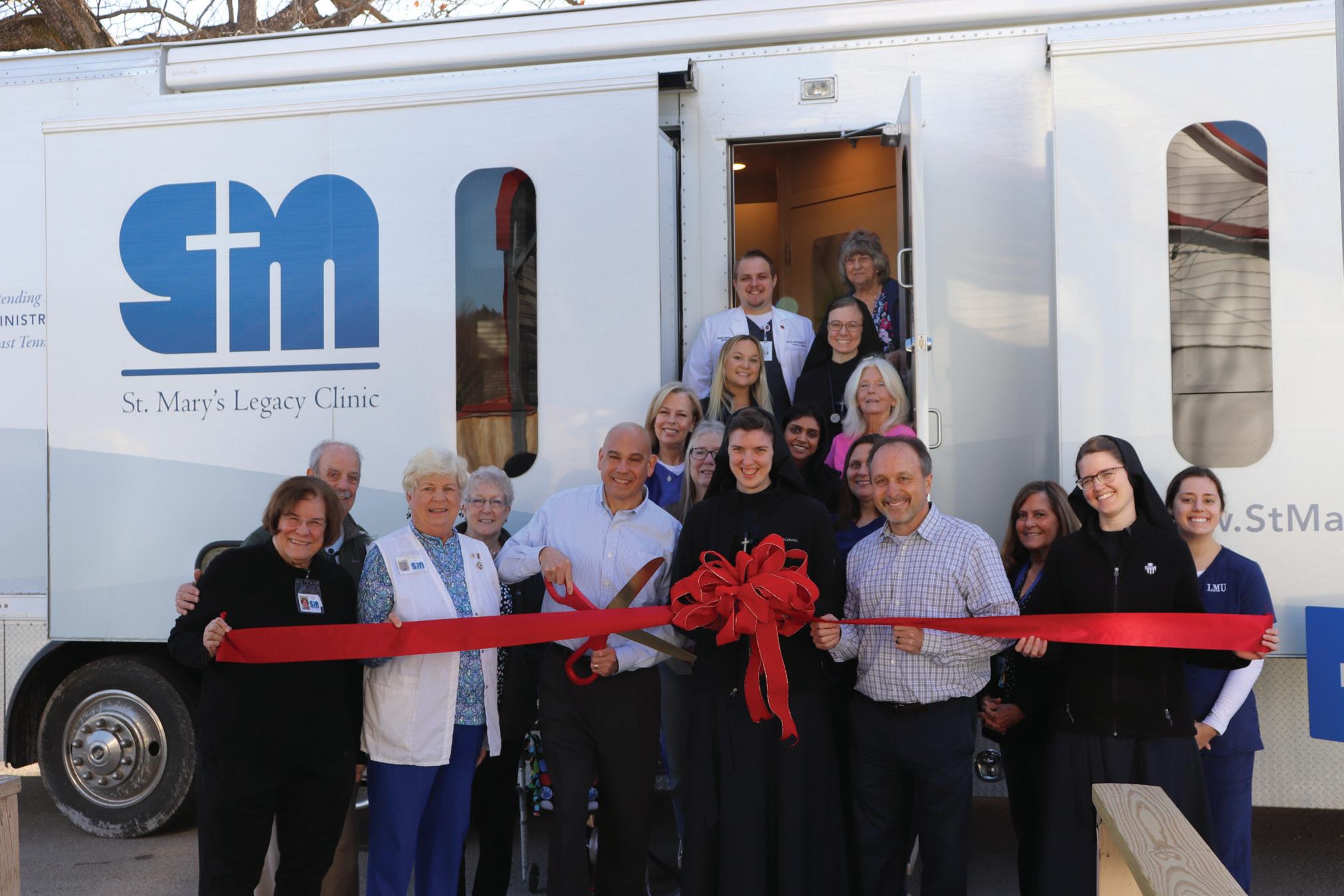
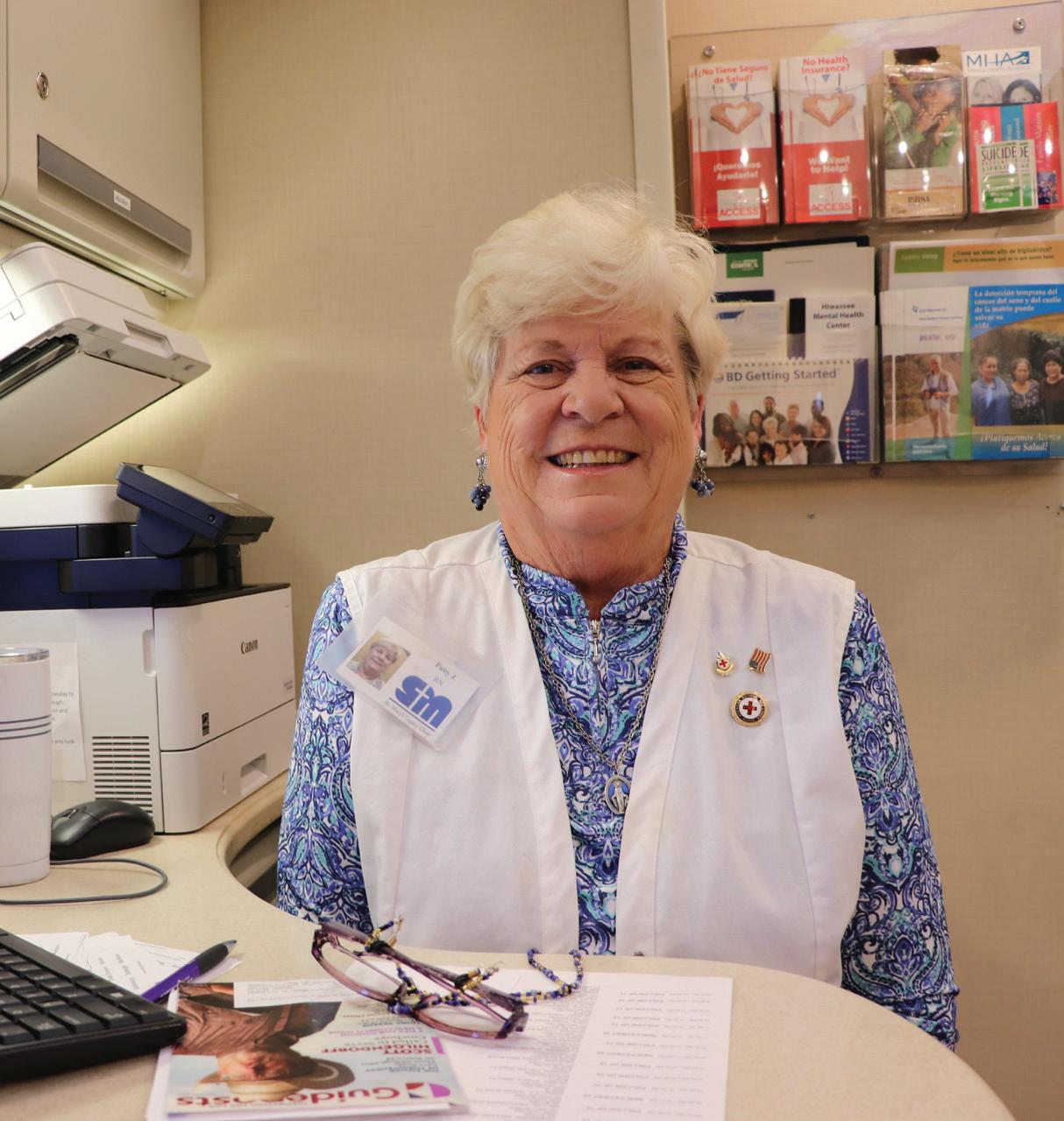


















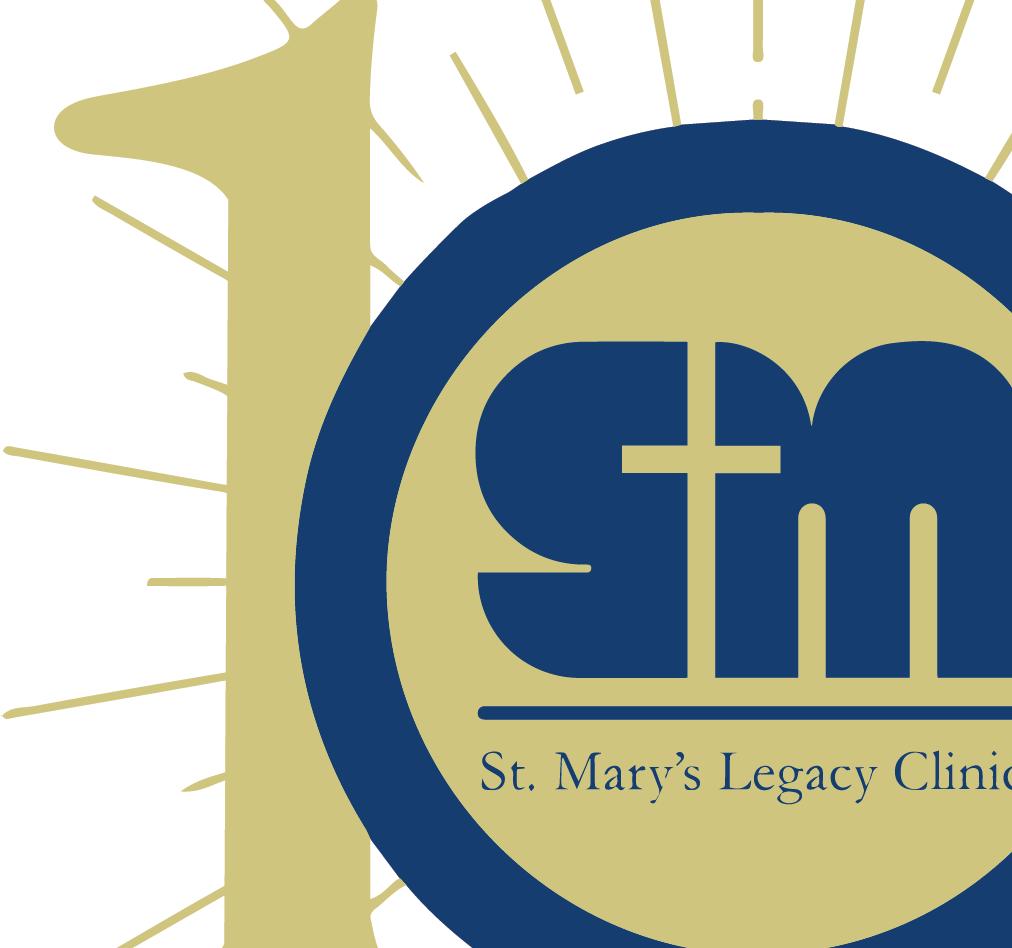






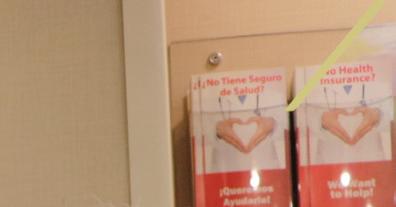














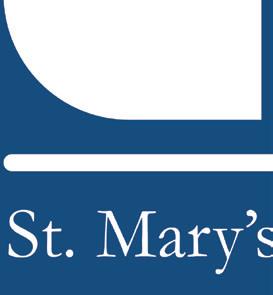

THE EAST TENNESSEE CATHOLIC A24 n AUGUST 6, 2023 www.dioknox.org Suppport the healing ministry of Jesus to East Tennessee through free health care made possible with your generous donation. SMLCares.com/2nd To donate: Or Scan the QR code!!!! Second Collection September 16th & 17th

















 By Gabrielle Nolan
By Gabrielle Nolan








 By Claire Collins
By Claire Collins


































































 By Matthew McDonald National Catholic Register
By Matthew McDonald National Catholic Register







































































